Far away on Mount Olympus lives the… Well, the Olympians — the twelve most important Greek deities.
In ancient Greece, the 12 Olympian gods and goddesses and the rest of their family were an important part of daily Greek culture. Each god and goddess ruled certain realms and also played their part in mythology; fascinating stories that helped ancient Greeks to grasp the world around them, including the weather, religious beliefs, and their own social system.
That being said, even the Olympian gods must earn a living.
Possessing so many powers and abilities, they all agreed that they would make excellent business owners, and so opened a grand mall and invited all the mortals.
Let’s grab a shopping bag and go explore the Greek god family tree!
Table of Contents
The Greek God Family Tree
Although it would be wonderful and easy to have a plain and simple family tree to understand the interconnections between all the Greek gods and goddesses, the reality is that things are a bit more complicated. Gods from different generations are studied together based on how they interact in different myths, creating groups such as the Titans and Olympians.
To understand the entire Greek god family tree, it’s important to understand the three different groups: primordial gods, the Greek Titans, and the 12 Olympian gods.
Primordial Gods: The First Generation of Greek Gods
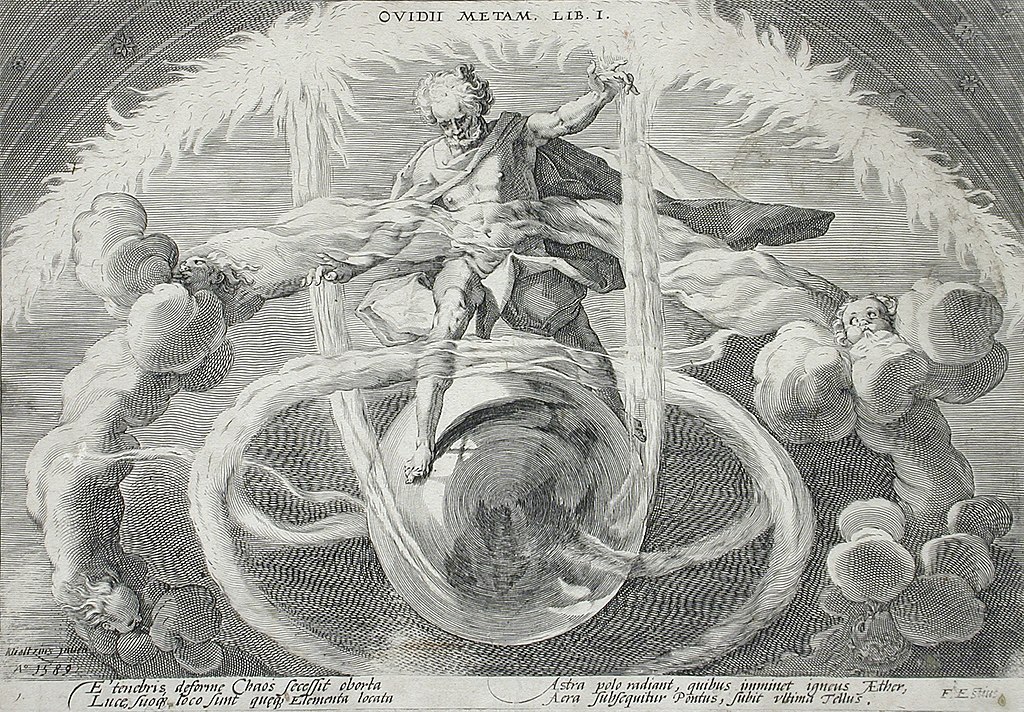
The word “primordial” means “existing in the beginning,” or “the earliest form.” When it comes to the Greek gods, these deities were the ones that existed before everything. They helped the ancient Greeks understand the creation of the universe.
Overall, there are several primordial gods. The first is Chaos, or “the void.”
From there, there are several more, including:
- Chaos (Void)
- Phanes (Order)
- Thalassa (Sea)
- Gaia (Earth)
- Uranus (Sky)
- Ourea (Mountains)
- Pontus (Sea)
- Tartarus (Underworld)
- Erebus (Darkness)
- Nyx (Night)
- Aether (Light)
- Hemera (Day)
- Eros (Love)*
*In some cases Eros is depicted as the son of Apollo and Aphrodite, who come after the primordial gods, but most sources indicate he was in fact a member of the original generation.
Titan Gods: The Second Generation of Greek Gods
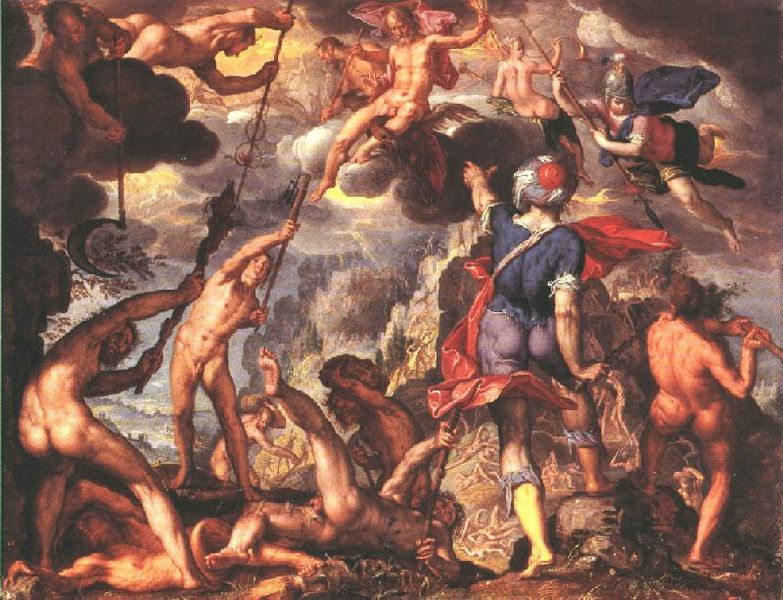
From the Primordial gods came the 12 Titans. According to Greek mythology, this family of Greek gods ruled the world before their slightly more famous successors, the Olympians. They ruled over important things such as time, light, the oceans, and more.
Eventually, however, things got a bit ugly when the leader of the Greek Titans, Cronus, tried to kill his children so they didn’t take over control of the world and universe. Understandably, his children revolted and launched a major war of the gods known as the Titanomachy, which eventually led to the rise of the Olympian gods.
Because of the fame of the Olympians, many of the Titans are forgotten, but they played a critical role in Greek mythology and in shaping how the Greeks understood the world. The 12 Titans were:
Olympian Gods: The Third and Most Famous Generation of Greek Gods
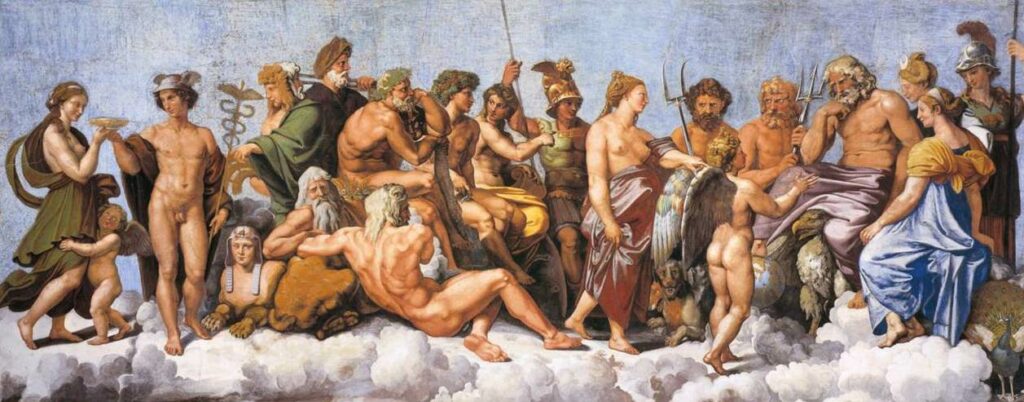
After defeating their father Cronus in the Titanomachy, the Olympians, named for their home, Mt. Olympus in Greece, rose to prominence in Greek mythology. The names in this group are some of the most famous in all of Greek mythology, and their many children and grandchildren make up the bulk of the characters we find in ancient Greek myths.
The 12 Olympian gods were:
- Zeus
- Hera
- Poseidon
- Aphrodite
- Artemis
- Apollo
- Hermes
- Hephaestus
- Demeter
- Athena
- Dionysus*
- Hestia*
- Hades✝
*There remains some debate as to who exactly was the 12th Olympian god. Some sources say Hestia, others Dionysus, though most scholars agree that Dionysus was number twelve due mainly to the extent to which he was worshiped in ancient Greece.
✝Hades did not live on Mount Olympus and is therefore considered separate from the Olympian gods. But as the brother of Zeus and a close relative of the rest of the group, he is usually placed in the same conversation.
41 of the Most Important and Well-Known Greek Gods
Primordial Gods: The First Greek Gods
The primordial gods helped the Greeks understand their existence. They were gods, but they were also concepts; ideas that humanized the vastness of the universe and made it easier to understand where life, and ultimately people, came from.
While quite different (less scientific, mainly) from how we understand the world today, the theories are similar and help connect this distant past to the present.
Chaos: The Void

Realms: The dark void of the Universe
Family Tree: Mother of Erebus and Nyx; grandmother of Hypnos and Thanatos
Fun Fact: Chaos is the firstborn of the primordial gods
Chaos is the vast emptiness of the cosmos. From Chaos, existence sprang forth. She acts as the antithesis to Gaia, producing restless, writhing beings.
Unlike others of her kind, this primordial god doesn’t have an active role in Greek mythology. Comparably, the children and grandchildren of Chaos are significantly more involved in the affairs of mankind.
While Chaos tends to wallow deep beneath the ground in a perpetual slumber, the deity is still affected by outer elements. Best not to go stompin’ around outside, folks!
READ MORE: Gods of Chaos
Phanes: Order
Realms: Light, procreation, divine law and order
Family Tree: First born of the void; husband to Nyx
Fun Fact: Phanes hatched from a cosmic egg
Phanes is a god that was adopted into Greek mythology from Orphic traditions. Thanks to the unique views of Orphism, Phanes’ birth was substantially different than the other gods and goddesses. While Aphrodite may have been born from sea foam, it isn’t everyday you get to see someone hatch from an egg!
In Orphic tradition, Phanes created day while his wife (and possible sister) Nyx created the night. He is credited with developing creation in general and was deemed king of the cosmos as a result. Phanes went on to pass the cosmic scepter to his wife, who then passed it to her son, Uranus.
Unfortunately, that family heirloom isn’t for sale. But, who knows what will happen in the next millenia? (Don’t tell Zeus)!
Thalassa: The Sea
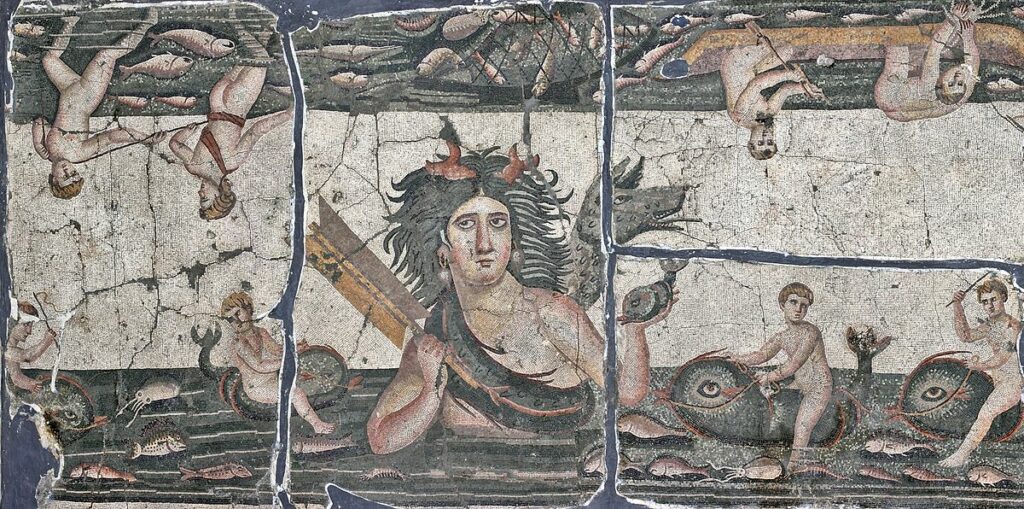
Realm: The body of the sea
Family Tree: Mother of Poseidon and Amphitrite
Fun Fact: She produced fish and all the other sea creatures
“There’s plenty of fish in the sea!” A phrase you may have heard used to cheer someone up after a breakup, it’s partly true thanks to the goddess Thalassa.
Much like the other primordial gods, Thalassa was not so much a god as a spiritual embodiment of the sea itself. She is said to have created all fish and sea creatures, which were amongst the first life forms on Earth and an important food source for countless living things.
Her son, Poseidon, went on to be the Greek god of the sea and one of the highly-revered Olympian gods.
Gaia: The Greek Mother Goddess
Realms: The mother goddess, earth, oaths, marriages, prophecy
Family Tree: Mother of Cronus, Ceto, and possibly Harpies; grandmother of Zeus
Fun Fact: Scientists use the word “Gaia” when they refer to the Earth as a living organism
Gaia can only be described as the ultimate creative goddess. She gave birth to the entire world, and several races of beings, including monsters and the Titans. One can say that creation is her gallery and that it’s filled with her artwork. Most, if not all Olympian gods, can claim her as an ancestor.
While Gaia is a motherly figure and the protector of children, she doesn’t hesitate to knock kings off their thrones. Because of her help, her son Cronus was able to defeat his father and become the leader.
Gaia was also the one who later helped her grandson, Zeus, overthrow Cronus. And then she tried to dethrone Zeus several times.
Before visiting the gallery, you’d be wise to throw a cautious glance through a window to make sure that there are no power struggles going on inside.
Uranus: Sky
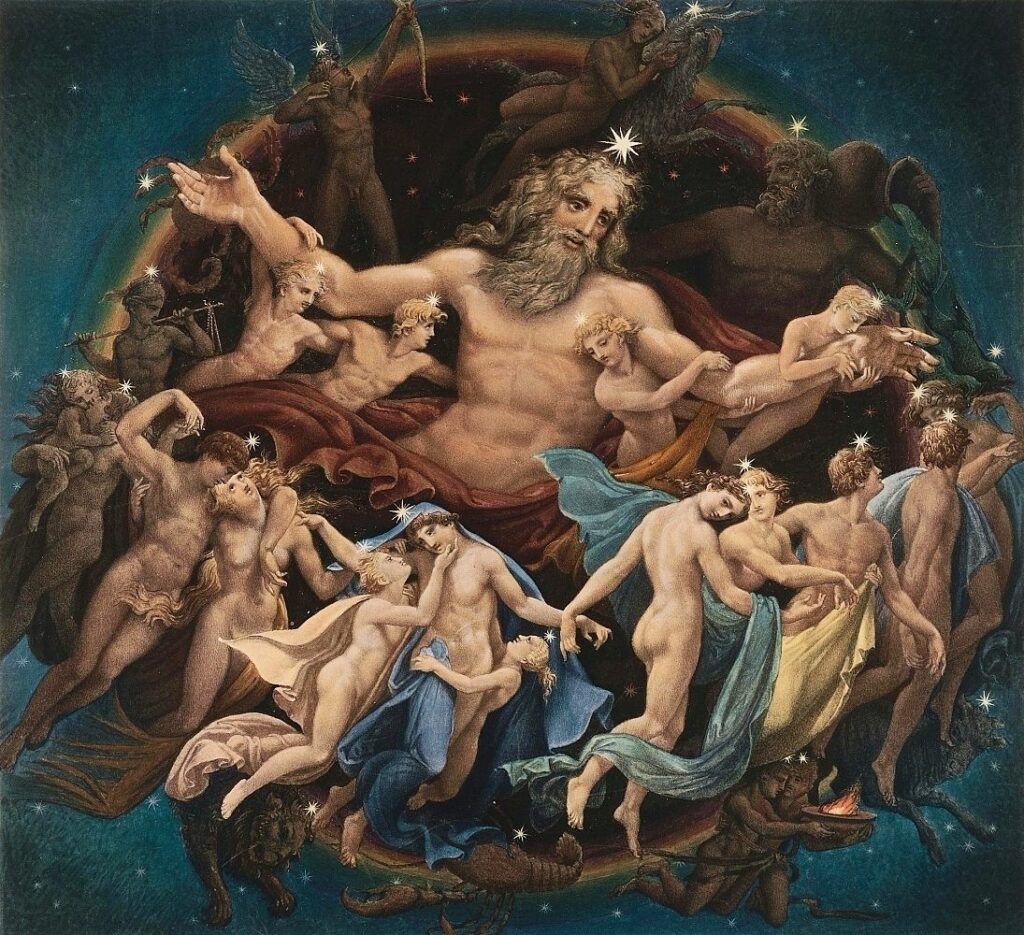
Realm: The sky and the Heavens
Family Tree: Husband and son of Gaia; father of the Titans; grandfather of Zeus
Fun Fact: Uranus locked up six of his children in Tartarus because he thought they were ugly
Uranus is the sky. He was created by Gaia to “shelter her around on all sides.” The legacy of Uranus in Greek mythos is that he was the first ruler of the Heavens.
Although Uranus enjoyed the benefits of being his mother’s consort and a mighty primordial god, he was a terrible father. And we aren’t talking about him forgetting birthdays, but he probably did that too.
Uranus’ attitude as a father and as a king eventually led to his demise.
Gaia teamed up with their youngest son, Cronus, and together they overthrew him. He was castrated and apparently he ran away to Italy. On that note, if you see any sketchy dude loitering about…you probably want to stay away from him.
Ourea: Mountains
Realm: The mountains (all of them)
Family Tree: Children of Gaia
Fun Fact: The Greeks knew of 10 Ourea in all – and two of them were an Olympus
The Ourea are ten mountain gods. Each one controls their own mountain and whatever goes down on it is their business.
As children of Gaia, they had tons of siblings whom they never extensively interacted with. They’re isolated deities, even when compared with the denizens of the Underworld.
The Ourea include the mountains Aitna, Athos, Helikon, Kithairon, Nysos, Olympus (x2), Oreios, Parnes, and Tmolus. So, don’t mind the big guys in the back. They’re content with staying away from the crowds.
Pontus: Sea
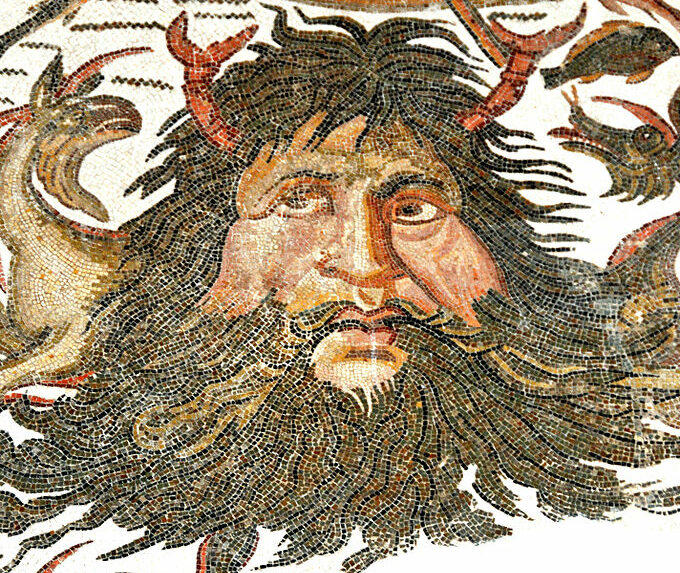
Realm: The sea
Family Tree: Father of a number of sea gods; grandfather of monsters
Fun Fact: Pontus was the personification of the Mediterranean Sea
Pontus is the god of the sea. Actually, he was the sea itself rather than being an oceanic resident.
Being one of Gaia’s son-consorts, Pontus became the father of several sea creatures and spirits. His fling with his mother occurred after his brother’s castration.
Pontus isn’t involved in many myths, as is the modus operandi for a lot of the primeval gods. However, his descendants don’t mind stirring up trouble. Both the “Mother of All Monsters” Echidna and the fearsome Gorgons are from Pontus’ lineage.
READ MORE: Water Gods and Gods of the Sea from Different Cultures
Tartarus: The God of the Underworld/The Underworld Itself
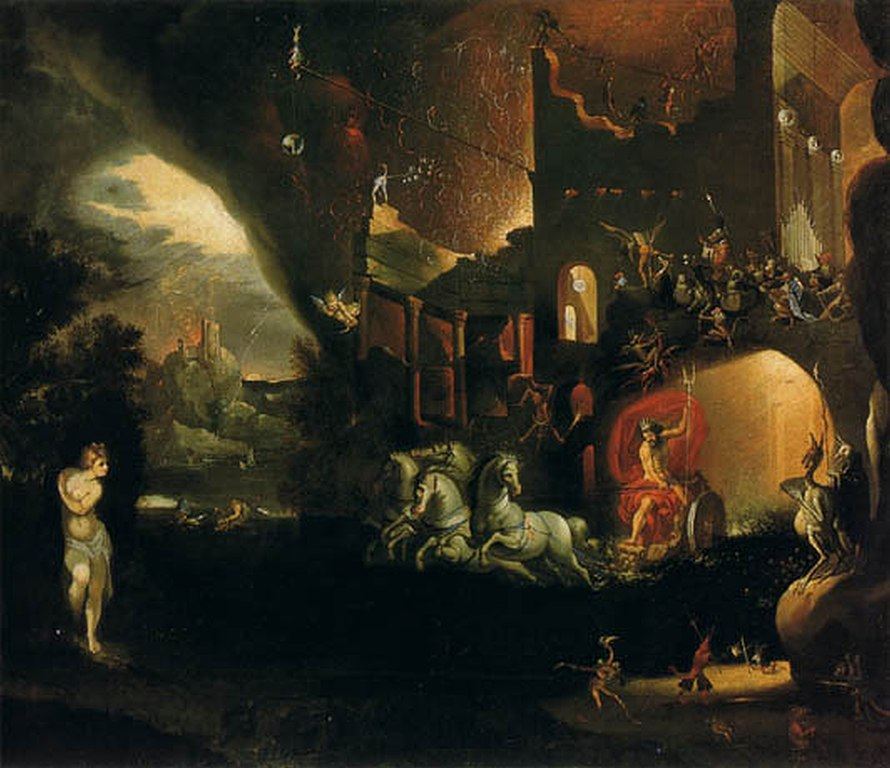
God Name: Tartarus
Realms: One of the underworlds, god of the Abyss
Family Tree: Sprang forth from Chaos
Fun Fact: Ancient Greeks believed that, should they drop a bronze anvil into the underworlds, it would fall for nine days before reaching Tartarus
Tartarus is either a god, a realm of punishment, or both. Tartarus spawned some of the most terrifying monsters known to Greek mythology, and the Olympian gods also imprisoned their rivals and any rebellious figures there. Overall, the abyss swallowed anyone who was too sinful to go to Hades in the afterlife.
While this is darkly fascinating, it also seems a little harsh that there’s a crowd of the mall’s teenagers in there. So what if they tasered Kratos? The god had it coming!
Erebus: Darkness
Realms: The Underworld
Family Tree: The brother of Eros; uncle to Zeus
Fun Fact: His name means, “Place of darkness between Earth and Hades”
Erebus is among the five oldest deities in the Olympian gods family tree. Indeed, his mother Chaos was believed to be the first Greek goddess. Meanwhile, his children spend their time hassling mortals.
Back in the day, the other gods made the world but left the Underworld unfinished. Erebus stepped up and built the rest; stuffing a dark mist into all the empty spaces before he moved in.
Seeing that the mist completed an entire realm and that his wife Nyx brought night with it, be assured that you can buy the same stuff for all of your own building needs. If, y’know, you’re into doom and gloom.
Hey, black-out curtains are BOGO!
Nyx: Night
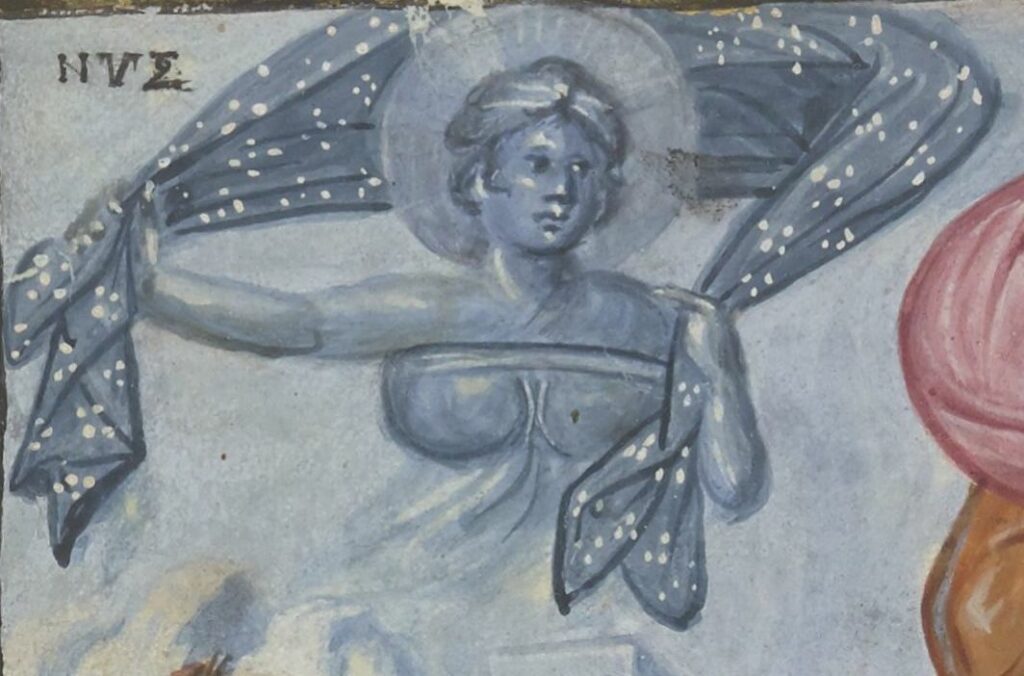
Realm: The night sky
Family Tree: Mother of Hypnos, Thanatos, and the Fates; sister of Gaia
Fun Fact: Nyx is thought to be the only thing that scares Zeus
Nyx, the goddess of night, is among the oldest deities of the pantheon. She is mother to a lot of personified spirits, usually those negative aspects of the human condition. Do you think it has something to do with being married to the primordial god of darkness?
Hm. Food for thought.
More often than not, Nyx can be found deep in the belly of Tartarus. She isn’t trapped there like the Titans, though. The lady just likes the neighborhood.
Rumors have it that after the Titanomachy, Cronus was locked up in Nyx’s cave. While strange, other deities don’t seem to be complaining about it. Maybe if you listen close enough, you will be able to hear this eccentric goddess reciting some of the ex-king’s prophecies!
Aether: Heavenly Air
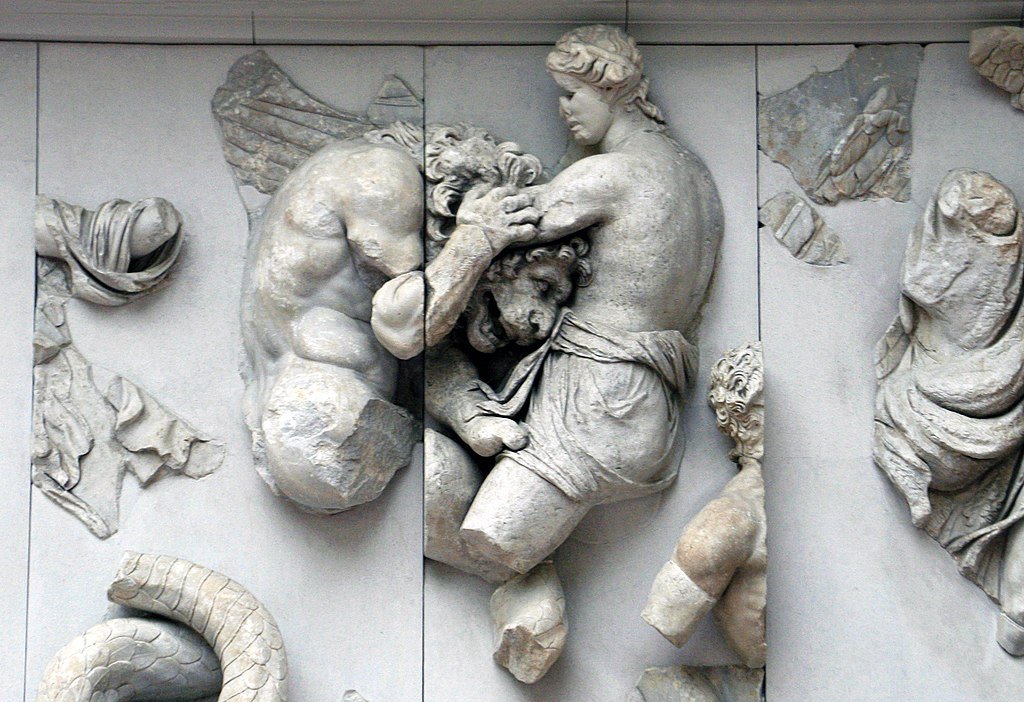
Realms: Heavenly air
Family Tree: Son of Erebus and Nyx
Fun Fact: Aether, together with his sister and parents, existed before the Olympian gods
Aether and his family are known as the Protogenoi, a group of deities born before all Greek gods. Since the latter had a chip on their shoulder, they didn’t breathe the same air as humans.
Aether’s realm was the pure air that was inhaled by the Greek pantheon on Mount Olympus. But with the help of his sister Hemera — who cleared their parents’ darkness from the world every morning — this primordial god also shone his light down on Earth.
If you feel like breathing in the hallowed atmosphere of the Olympian gods, there are bottles available from Aether’s shop for only $24.99!
Hemera: Day
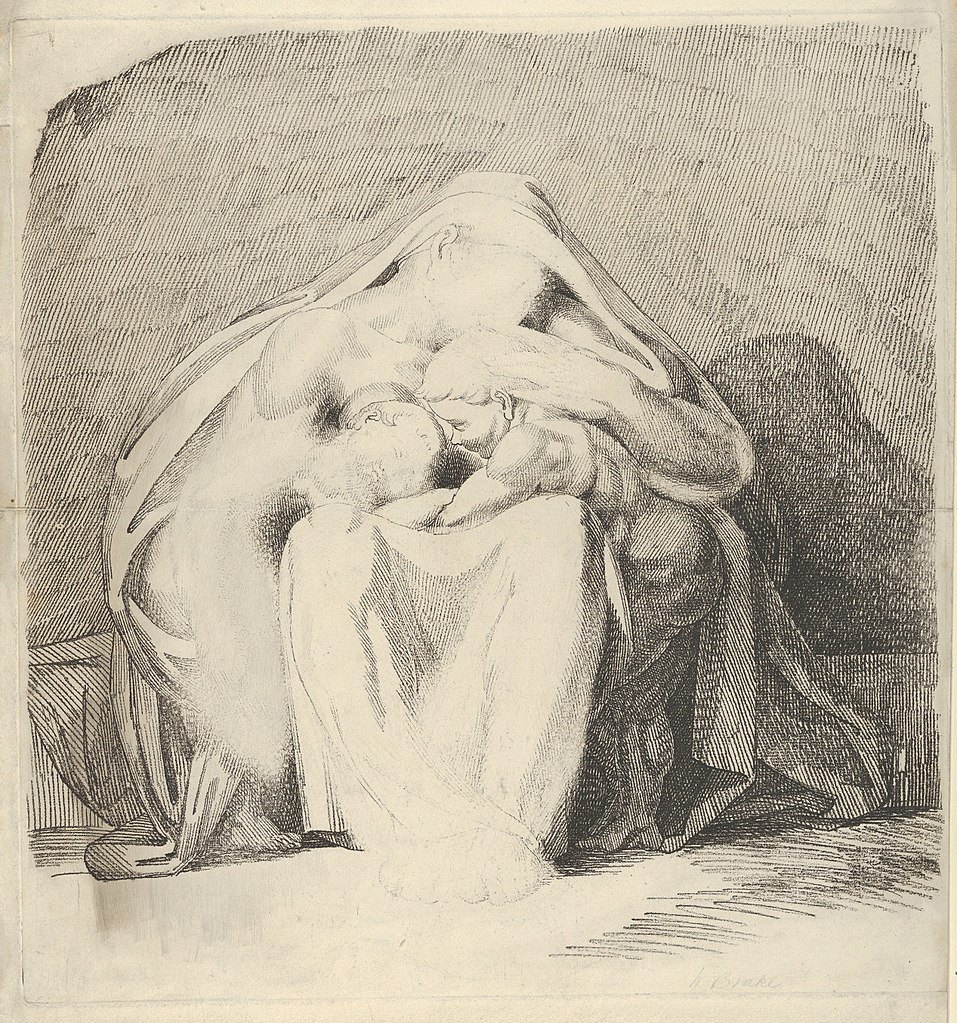
Realm: The daytime sky
Family Tree: Daughter of Nyx and Erebus; wife of Aether
Fun Fact: Hemera is frequently thought to be Eos; later history have the two as aspects of each other
Hemera is the goddess and personification of day. She was said to ride a chariot across the sky every dawn to chase away the dark mist that was carried by her mother. Whenever Hemera would clear the skies, the bright light of her brother-consort, Aether, would shine on the Earth.
There are no known ancient myths involving Hemera, though there are plenty that involve the goddess of dawn, Eos. Since the two later become identified as a single deity, you can probably tape Hemera’s name over that of Eos.
Eros: Love
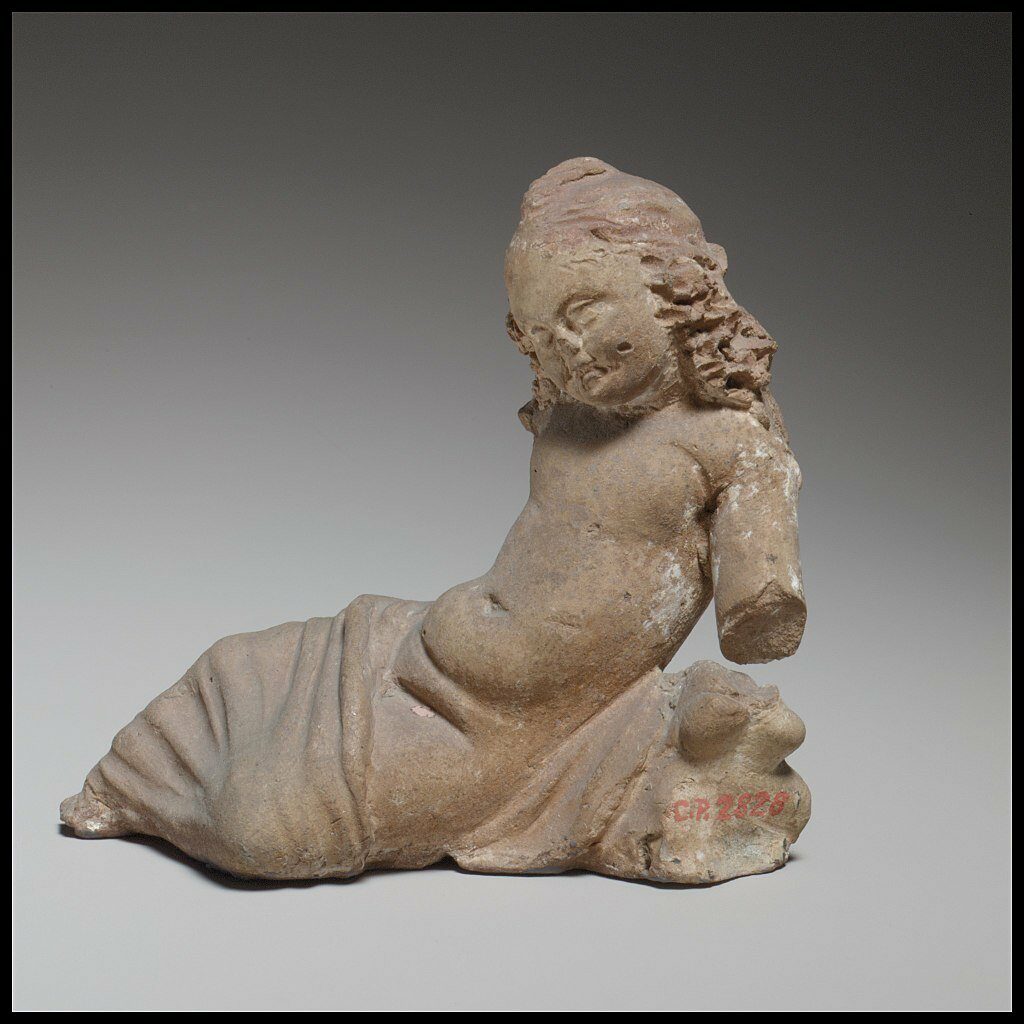
Realms: Goddess of love, lust, physical desire, passion, fertility
Family Tree: Primordial god, also sometimes the son of Aphrodite and Ares. Somewhat contradictory as the primordial gods came before Aprodite and Ares, but such is the nature of Greek mythology: different sources say different things, muddling the family tree and our understanding of the Greek gods.
Fun Fact: Ancient Greek art showed Eros as a youth — the later Roman era showed him as a baby with wings
If you’re single and fine with an arrow stuck in your heart, why not visit the Eros Lounge? As far as names in Greek mythology go, the god Eros is better known as his more common moniker, Cupid.
(The latter is his Roman counterpart, and the two are more or less identical — both have wings and make random people fall in love with each other.)
Eros isn’t bothered with emotional connection; when he shoots someone, it’s to provoke raw physical desire. Unsurprisingly, he’s also a fertility god and by most accounts the son of the love goddess, Aphrodite.
But despite his fame, Eros was never promoted to Olympian. He wasn’t particularly liked on Mount Olympus, as none of the other Olympian gods were immune to his craft and they hated that he sometimes plonked arrows into them for his own cruel amusement.
Hence the reason he also happens to be seen as a trickster god.
The 12 Greek Titans
From the primordial gods came the Titans. This group of twelve gods were the first to rule the world in a meaningful way and help bring a lot of structure to the Greek pantheon. Many of the most famous Greek gods and goddesses we know today were not actually Titans themselves, but they were their offspring.
Many of these gods were replaced later in Greek history and largely fell out of favor amongst worshippers, though their stories remain relevant until today.
Oceanus: God of the Great River
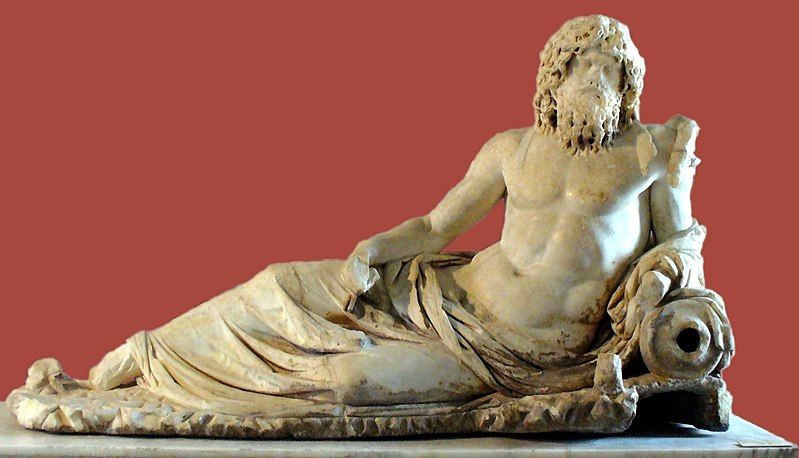
Realm: The great river Oceanus
Family Tree: Zeus’ cool uncle; father of the Oceanids; grandfather of the goddess Athena
Fun Fact: The River Oceanus was thought to be at the end of the world; turns out it may just be the Atlantic Ocean
Oceanus was the god of a very specific river. Despite this, he is one of the most important gods on the list. The god had it all: a nice abode, a happy marriage, and lots of tykes running around.
When the Titanomachy shook the world and his baby brother was booted from the throne, Oceanus remained neutral. Zeus digged that, even going so far as to marry Oceanus’ daughter, Metis, making her his first wife.
Although not a direct being in many myths, the Titan god Oceanus was a force to be reckoned with. A number of Greek heroes were challenged with crossing Oceanus’ waters, described to be gray and fickle. Beyond the great river there was said to be a gate to the Underworld, a land of eternal twilight, and the fabled Garden of the Hesperides.
Thankfully, Oceanus’ navigation shop is right next door to Tethys’ Spring Water & Splunking Supply.
Coeus: God of Intelligence and Inquiry
Realm: Intellect, inquiry, curiosity, the Northern axias
Family Tree: Father of Leto and Asteria; grandfather of Apollo, Artemis, and Hecate
Fun Fact: Coeus’ name means “questioning”
Coeus is the Titan god of intellect, so he can probably answer your most burning questions.
In spite of being a scholar at heart, Coeus ended up siding with Cronus during the overthrow of their old man. He was one of the four brothers that held Uranus down while Cronus castrated him.
This loyalty to Cronus lasted years and next thing Coeus knew, Zeus was king. He, along the rest of the Titans that sided with Cronus, were banished to Tartarus. No one has heard from him since.
It is a bit of a shame. His shop has tons of books just collecting dust.
Crius: God of Heavenly Constellations
Realm: Constellations, heavenly bodies, the Southern axias
Family Tree: Husband of Eurybia; father of Astraios, Pallas, and Perses
Fun Fact: Crius’ name derives from the Greek word for “ram”
Crius was the Titan god of constellations. Unfortunately for Crius, no horoscope could have warned him what was in store for his future.
During the Titanomachy, Crius was one of the allies of Cronus. Old habits die hard, like supporting your maniacal brother. Although Zeus took a fancy to his daughter, Leto, that wasn’t enough to save Crius from imprisonment in Tartarus.
Legend has it that before his arrest, Crius stashed his old tarot deck somewhere in the mall.
Hyperion: God of Heavenly Light

Realms: God of heavenly lights
Family Tree: Son of Uranus and Gaia
Fun Fact: By joining the coup against their father, he helped his brother Cronus to become leader
Kids love this shop. They get combat vests and laser guns, then run around in a maze and shoot each other with green and red beams.
Hyperion is the perfect god from Mount Olympus to operate such a light show — he’s the god of all the lights in heaven, and was also one of the four pillars that held up the sky so that it wouldn’t crash into the Earth.
His wife, Theia, was the goddess of blue skies. While they might not be as familiar as Zeus or Athena, you might recognize the following Greek diety names: Helios the Sun god, Selene the Moon goddess, and Eos the Dawn goddess, who were all their children.
Since everyone from this branch of the Greek god family tree shines with light, everyone pitches in at the laser arena.
Cronus: Supreme Ruler of the Titans; Greek God of Time
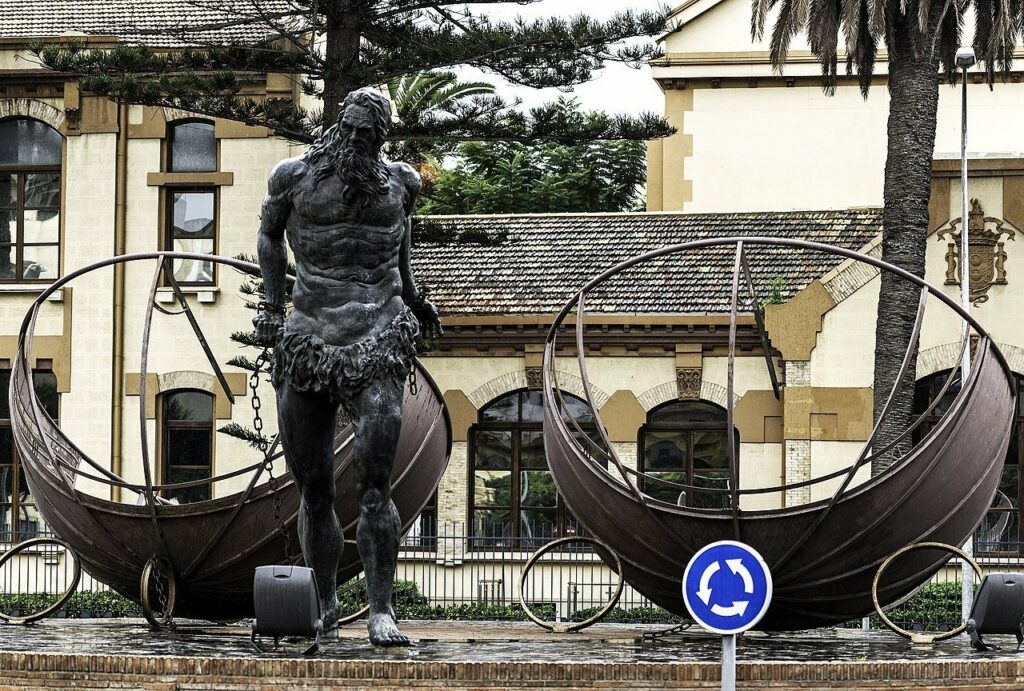
Realms: A creator god and, briefly, the supreme ruler of the gods
Family Tree: Father of Zeus and Hera
Fun Fact: While still in the womb, Cronus castrated his father
Cronus knows a thing or two about dysfunctional gods and the fear they bring. His own father, Uranus, was a tyrant. He overthrew him and, for a while, the world prospered under Cronus’ rule. Until he feared his kids would also challenge him — so he ate them all.
Then, his son Zeus escaped and kicked his butt — though, alright, it was more of a decade-long war, but Zeus eventually plucked Cronus off the throne and, if Greek mythology holds true, also banished him to the Island of the Blessed.
There, Cronus led a happy life and became a good god again. See? It all worked out for the best!
Thea: Goddess of Sight and the Shining Atmosphere
Realm: Vision, sight, shiny rocks, the bright atmosphere
Family Tree: Mother of Helios, Selene, and Eos; wife of Hyperion
Fun Fact: Thea also goes by Euryphaessa
Thea is the goddess of sight – who better to run an vision center? She also runs a wholesale jewelry shop on the side. Thea even has a secret cleaning technique that leaves her products shining like new. Apparently Hades is a regular there.
Like many of her sisters, Thea avoided the scandalous family affair that was Titanomachy. As a result, she gets to be a prison penpal to her husband and brothers.
Rhea: Goddess of Healing
Realm: Healing, fertility, generation
Family Tree: Mother of Zeus; grandmother of many gods and demi-gods
Fun Fact: Rhea cured her grandson, Dionysus, of madness
Rhea is a multi-talented goddess that can heal the most egregious of wounds. Moreover, she wasn’t only a Titan god: Rhea was the mother of Zeus and, at a time, queen of the Heavens.
So, yeah, she’s a pretty big deal around Mount Olympus Mall!
Compared to other Titans, Rhea has a bit more of a presence in Greek myths. Still not a ton, but more than most. In these scarce myths, Rhea is frequently venerated as the “Mother of the Gods.”
Sure, she let five out of six of her children get swallowed by her husband, but saving the youngest really worked out in her favor.
Mnemosyne: Goddess of Memory
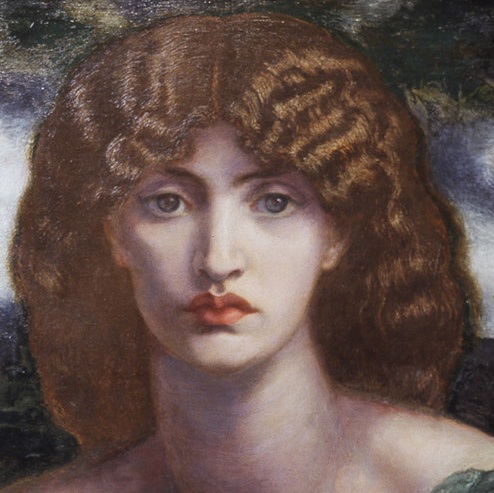
Realm: Memory, remembrance
Family Tree: Mother of the 9 Muses
Fun Fact: Mnemosyne had her own pool in the Underworld
Mnemosyne is the Titan god of memory. She’ll help you remember your grocery list if you ask nicely. Though, if you happen to get on her bad side, you may find yourself remembering your most embarrassing moments while you’re trying to get some shut eye.
More often than not Mnemosyne is remembered (haha) for bearing eloquent, musical daughters. Besides that, she pops into myths every now and again.
According to Zeus, Mnemosyne is unforgettable. Just don’t spill the beans to Hera.
Phoebe: Goddess of Shining Intellect
Realm: Intellect, prophecy
Family Tree: Daughter of Gaia; grandmother of Artemis, Apollo, and Hecate
Fun Fact: Artemis and Apollo alternatively go by Phoebe and Phoebus in honor of their grandmother
Phoebe is the Titan god of shining intellect. Generally, she is the feminine aspect of her husband, Coeus, since both gods prioritize book smarts over street smarts.
While Phoebe is the grandmother to a huntress, a musician, and a witch, she has her own favorite past times. Outside of petitioning Zeus to re-open Coeus’ book store, Phoebe (unofficially) organizes the affairs of oracles. It was a habit of her mother’s that was eventually passed down to Apollo.
The Oracle of Delphi is a family favorite! They make sure to make it out to “the navel of the world” at least once or twice a year. Phoebe finds it much more relaxing without that giant python slithering about.
Tethys: Sea Goddess and Mother of Ocean Nymphs
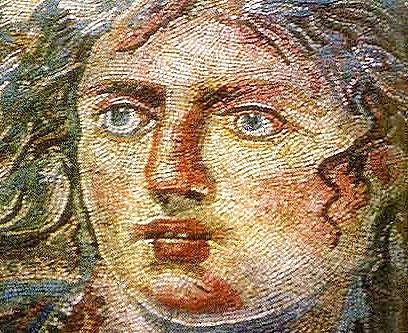
Realm: Fresh water, springs, wells
Family Tree: Mother of the Oceanids, Potamoi, and the Nephelai
Fun Fact: Tethys shows up on a lot of bath house mosaics
Tethys is the Titan god of fresh water. She is the reason for rivers, wells, underground springs, and all other sources of fresh water you can think of. Despite this, her marriage to Oceanus more or less makes her a sea goddess.
READ MORE: Who Invented Water? History of the Water Molecule
A mother first, Tethys raised innumerable children alongside her husband. There were nymphs, rivers, clouds – you name it! They even housed Hera for the decade-long Titan War to try and instill in her some patience.
Being gods of water, you’d think they could teach the future queen a thing or two about managing her anger and going with the flow. Except, Hera held grudges like no other and – let’s be honest – they probably didn’t expect Zeus to be cheating constantly.
Okay, so if Hera is a testament to anything…maybe it is best that Tethys didn’t open a finishing school. What? Her daughters thought it was a great idea!
Other Important Titan Gods
Atlas: God of Astronomy
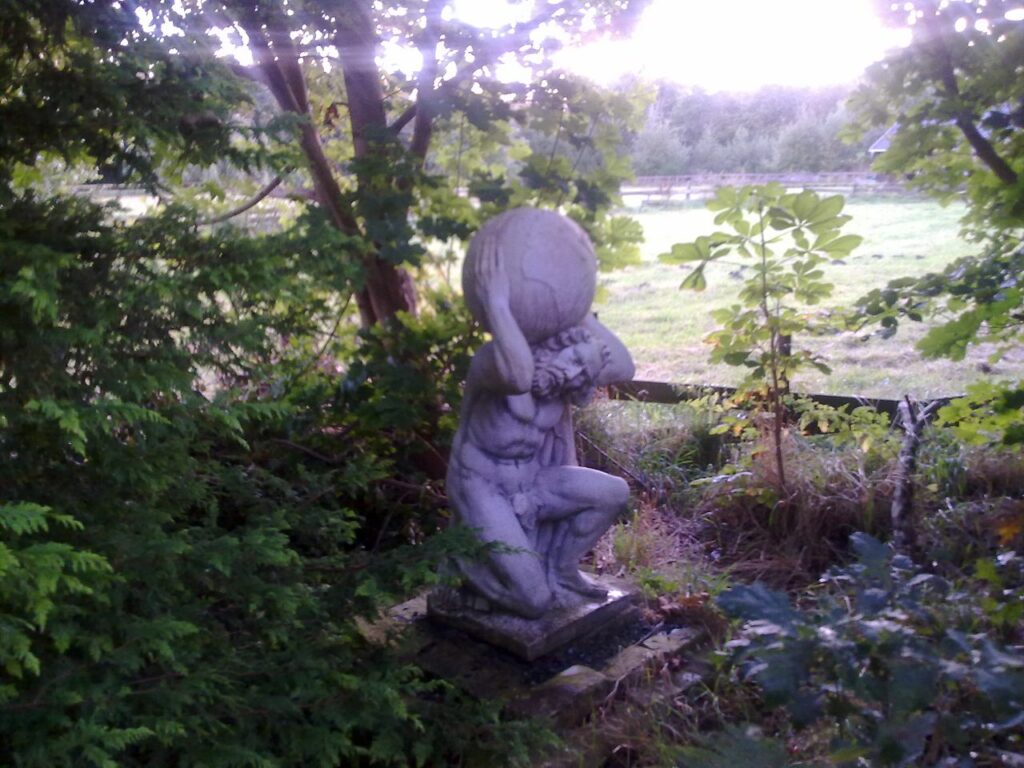
Realms: Astronomy
Family Tree: Brother of Prometheus and father of Calypso
Fun Fact: Atlas helped Hercules (Heracles) complete one of his twelve tasks
Among Greek deity names, one of the most familiar is Atlas. This guy lent his name to tomes of maps but he was chiefly the god of astronomy. As such, you can buy star maps from his shop.
Some charts might even show his children — as odd as legends are sometimes, in Greek mythology, Atlas is often named as the father of several star constellations.
It’s also known that his love of the heavens went a little too far. Atlas led an uprising against Zeus to take control of the heavens away from the Olympian gods and hand that power to his people — the Titans.
When Zeus retaliated, he decided that stabbing Atlas with a thunderbolt did not fit the crime. The little rat needed something worse. Instead of a somewhat-brief electric shock, Zeus forced Atlas to carry the world and skies on his shoulders for all eternity.
Somebody should probably take this god some aspirin.
Prometheus: Trickster God and God of Metalwork and Fire
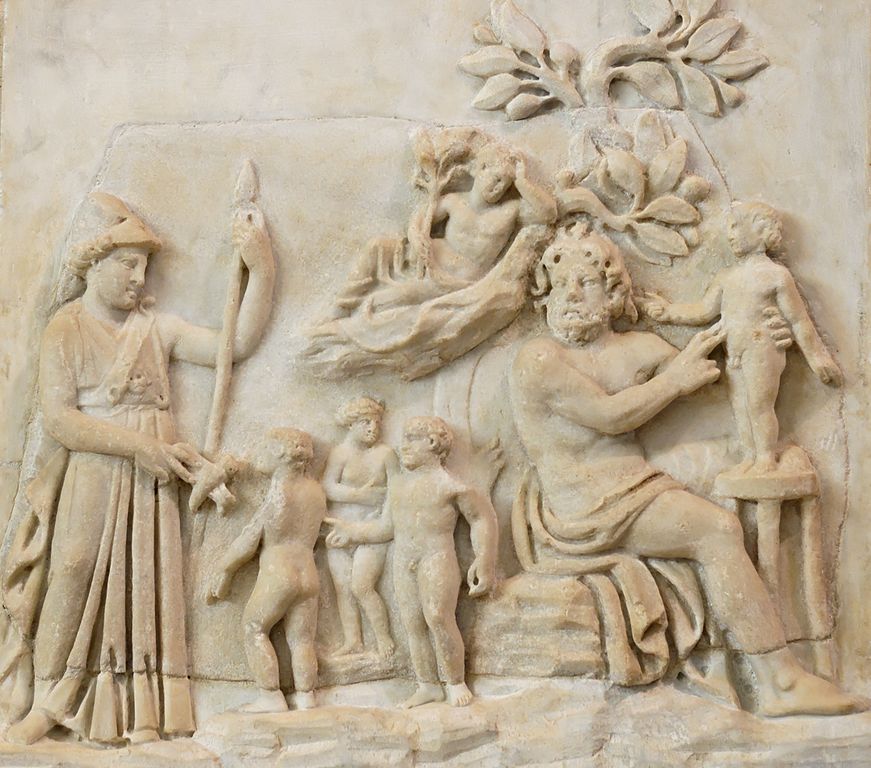
God Name: Prometheus
Realms: Trickster god, associated with metalwork and fire
Family Tree: Brother of Atlas; son of Iapetus and Clymene
Fun Fact: Ancient Greek potters (whose work required fire) worshipped Prometheus
Napalm, firelighters, matches, barbecue bricks — whatever you need to start a blaze, Prometheus can help you. This god loves to give humans fire, something that landed him in hot water in the past.
According to Greek mythology, ancient Greeks shivered from the cold and had to eat raw foods because they couldn’t roast anything. Fire belonged to the gods. Other myths say that humans already had fire but lacked metalworking skills.
Either way, Prometheus stole fire from the gods and took the flames and the gift of metalworking to mortals. For his kindness, Zeus had him chained to a rock where an eagle ate his liver every day.
The 12 Olympian Gods
Zeus: God of the Sky and Thunder; King of the Olympians
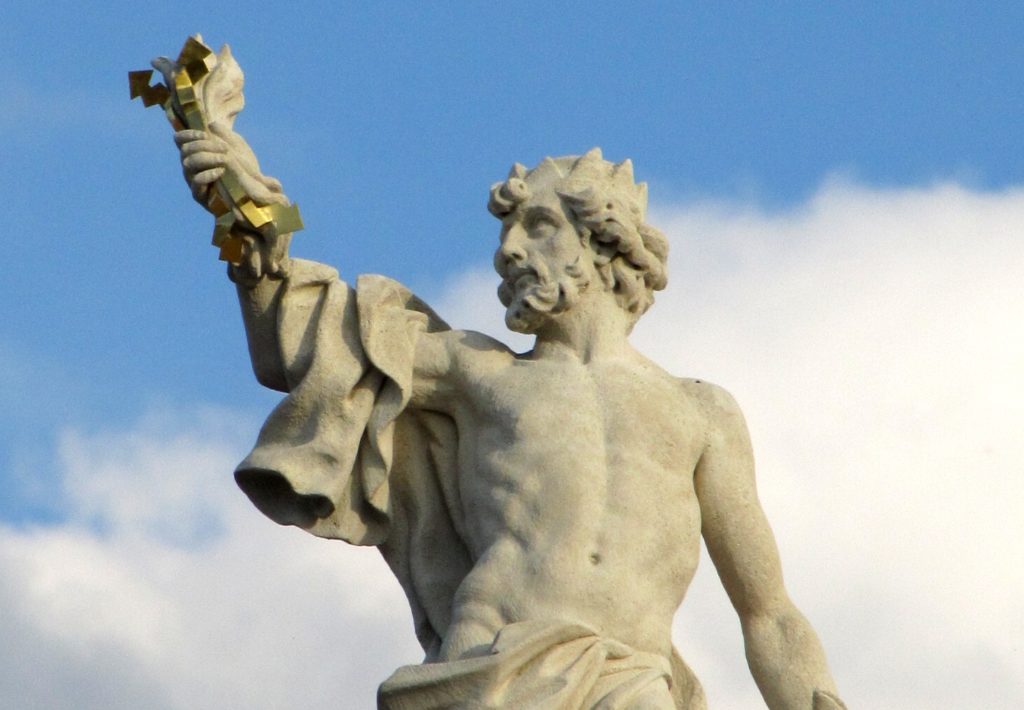
Realms: god of the sky, thunder and lightning, honor, hospitality, royalty, and order
Family Tree: Husband of Hera and a prolific father. His most famous children were Hercules and Athena, while less known are the Horae
Fun Fact: Zeus had two servants named Violence and Force
From his corner office, Zeus rules over Olympus Mall just like he rules over the world. He sits on a golden throne and has the power to impose his will on any living thing. Both are perks that come with being the king of all Olympian gods.
However, as the patron of guests and order, Zeus wants honest business and hospitality at the mall. Anyone who cheats a customer — or a customer that shoplifts — will feel the sky god’s wrath.
Zeus has been known to pierce offenders with thunderbolts but everybody is, uhm, totally fine with his electric brand of justice.
After all, he’s loaded with supreme power and easily angered, so nobody’s going to argue with that.
Hera: Goddess of Marriage and Family
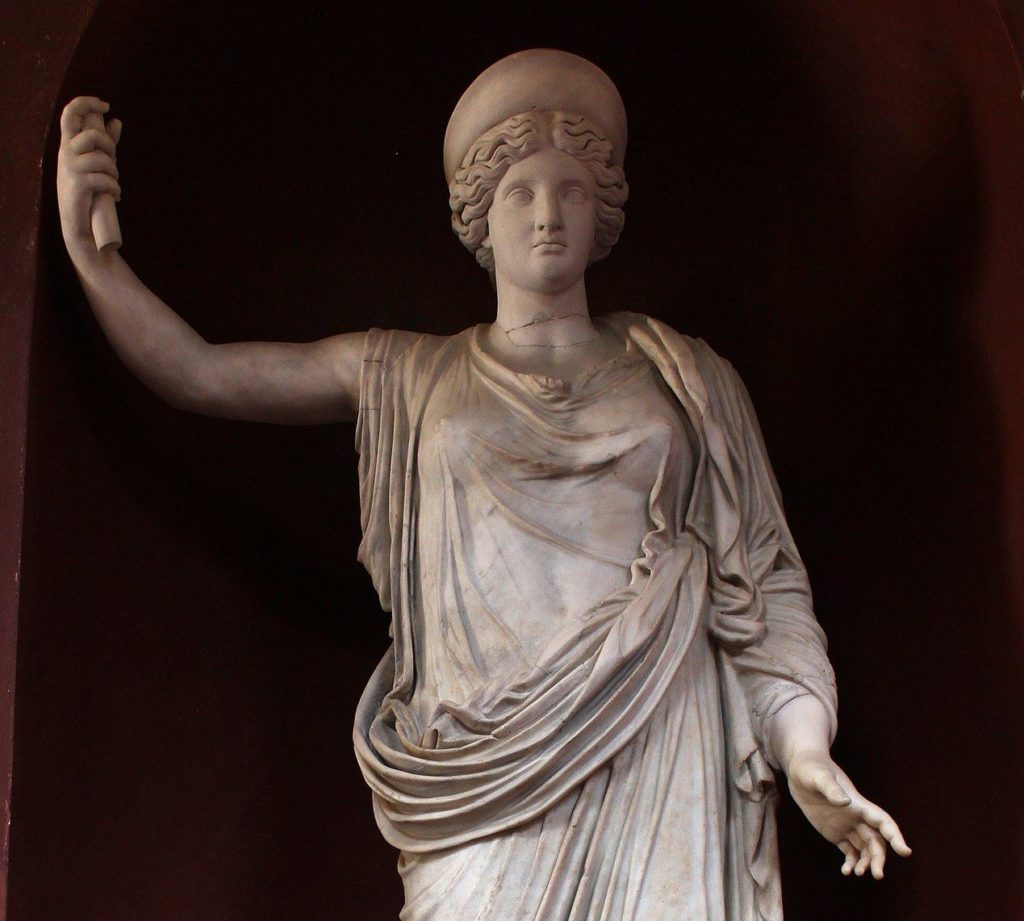
Realms: Marriage, family, monogamy, fidelity, queen of the gods
Family Tree: Wife of Zeus; mother of Ares, Eileithyia, Hebe, and Hephaestus
Fun Fact: She instigated the famous twelve labors of Hercules
This Greek goddess is married to Zeus, and she has a particular hatred for cheating partners since her husband has a roving eye. Hera values marriage, monogamy, and family.
But there’s no chance of her having a faithful spouse, which could be why Hera hunts down cheaters like it’s therapeutic.
Plus, she can do more than just give you a list of the Olympian gods who may be having an affair with your significant other. For extra payment (or perhaps just by accusing Zeus of being involved), The queen of the gods will wreak havoc against all involved.
Since spousal revenge doesn’t pay too well these days, this goddess also peddles the three things that are sacred to her. Should you feel the need to take home a peacock, a cuckoo, or a bouquet of lily flowers, then Hera’s Investigations/Pet Parlor/Flower Place is the shop to visit.
Poseidon: God of the Oceans, Water, and Storms

Realms: The oceans, waterways, storms, floods, and earthquakes
Family Tree: Full brother of Zeus and Hades
Fun Fact: The winged horse, Pegasus, is his offspring
Zeus has conflicting feelings about this brother — Poseidon is destructive and also attempted to overthrow him once. Worse, he always interferes with the Olympian leader’s plans.
But the Greek pantheon must run smoothly on Mall Day, and Zeus allows his brother to operate a snack stand.
Surely, no harm can come from that. But the Zeus-Network is not the only business in town.
The god of the sea is profiting from his realms’ disasters. Indeed, what looks like a fish-and-chips cart is the mall’s black market. Here you can buy storms, earthquakes, and floods to smite thy enemies (a bag of earthquakes includes a free trident, too, by the way).
Poseidon causes tremors by hitting the ground with his own trident — now his customers can do the same.
You buy some — you know, totally not to smite the taxman — and pay Poseidon with the horse-hide air fresheners. The sea god happily accepts, since he’s also the god of horses.
READ MORE: Poseidon’s Trident: A Legendary Weapon of the Sea God
Aphrodite: Goddess of Love, Beauty, and Desire

Realms: Love, desire, beauty, sexuality
Family Tree: Mother of Eros; married to Hephaestus the god of fire, although she had many love affairs outside her marriage both with gods and mortal men, including Adonis
Fun Fact: In Greek mythology, she sparked the Trojan war after uniting the lovers Paris and Helen
Hephaestus isn’t sure about this. His wife Aphrodite already had affairs with the Olympian gods Ares, Dionysus, and that idiot in the golf cart, Hermes. But her kissing booth is making decent money.
As the goddess of attraction, love, and desire, she can lure in anyone she wants.
During ancient times, this Greek goddess was incredibly important. She was revered by both women and men, and was worshiped as the protector of several groups.
These included prostitutes, city officials, and sea travelers. In ancient Greek culture, Aphrodite was also associated with warfare, politics, and commerce. For double the price, she’ll kiss and tell about the best stocks for hopeful investors to buy.
Artemis: God of Wildlife, Hunting, and Archery
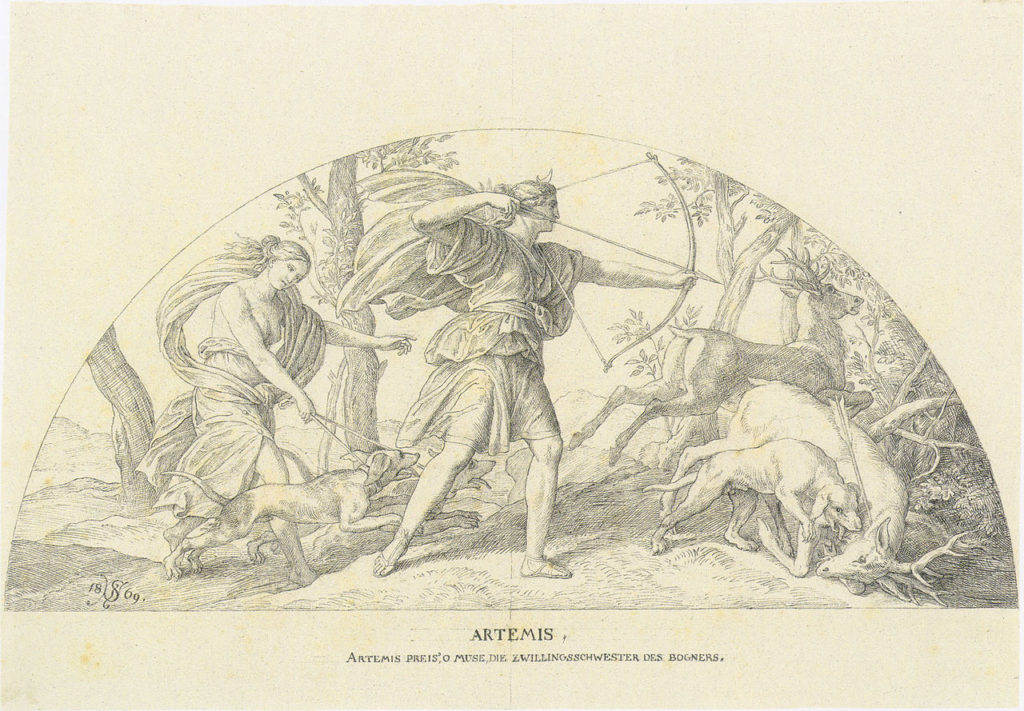
Realms: Wildlife and hunting, chastity, wilderness, childbirth, children, archery, the Moon
Family Tree: Daughter of Zeus and Leto; twin sister of Apollo
Fun Fact: The bear is her sacred animal
The goddess of the hunt runs an archery range inside the mall.
There are fake deer to shoot at and everybody’s having fun. But every now and again, someone meets with a violent end; especially those who wink at Artemis (who hates being courted), anyone who gets romanced by her father (she killed one of her own nymphs for this), or anyone boasting that they are better than her and her family (she murdered the children of a woman who boasted she had more offspring than Artemis’ mother).
Despite that last one, Artemis is also the protector of women and children. In the past, women who became sick or recovered from an illness looked to this bow-carrying goddess.
She was thought to bring disease in women while also being their healer. Overall, Artemis remains one of the most widely-known and respected deities in Greek mythology.
Artemis once fell in love with a hunter named Orion. Apollo, her vindictive twin brother, challenged her to an archery match to shoot at what looked like a mere speck in the distance. Artemis was very competitive, so rose to the bait, aiming straight at the target, only to find out too late that she had killed Orion.
Apollo: God of Healing, Medicine, and Archery
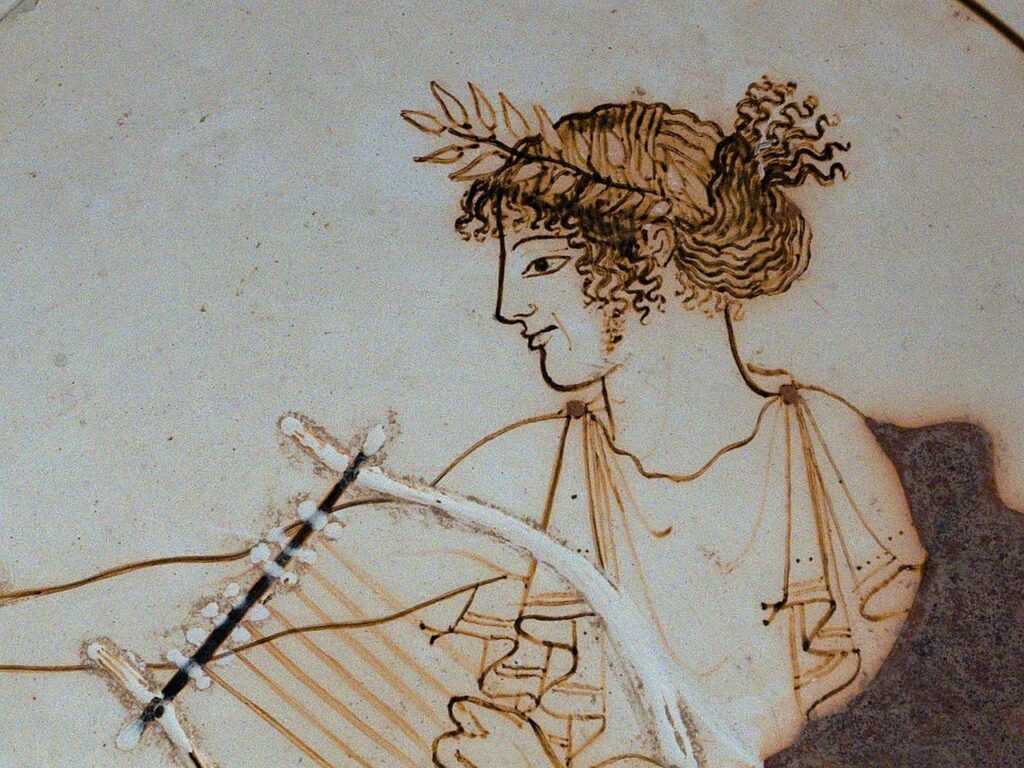
Realms: Healing, medicine, archery, prophecy, justice, poetry, and music
Family Tree: Son of Zeus; twin brother of Artemis
Fun Fact: He oversees the muses (goddesses of the arts)
While his father, Zeus, runs the mall, Apollo’s realms make him the manager of the flea market. There, you can rifle through stalls that sell medicine, archery equipment, music, and cute poetry boards that you can put on your wall.
In the Greek pantheon, Apollo is a fascinating character. He’s one of the twelve Olympians and was said to have chosen the first Oracle at Delphi — an important line of women in Greek culture who were able to tell the future.
Additionally, as the god of healing, he’s also the mall’s doctor. Indeed, Apollo is behind a famous medical image seen today — a pair of snakes wrapped around a wand. As the story goes, a long time ago, he gifted the healing stick to Hermes, the messenger god, who tested it on dying snakes. The reptiles healed and permanently wound themselves around the staff, thus creating the “caduceus.”
And like his twin sister Artemis, Apollo is well skilled in archery. Both Apollo and Artemis lived in the realm of the intellect, will, and mind, so Zeus understood and favored them. He gave Apollo golden arrows, and Artemis silver ones to practice their archery skills.
Hephaestus: Blacksmith God
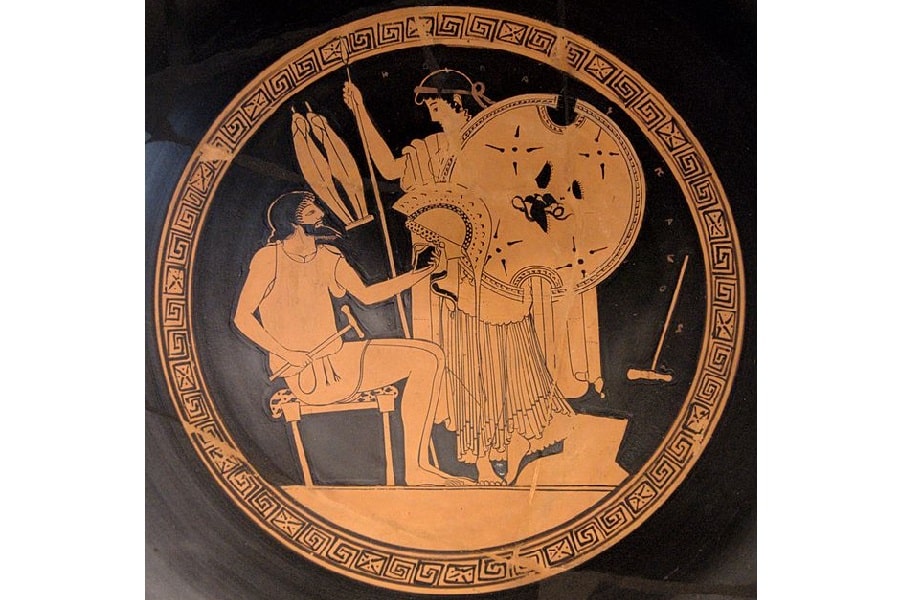
Realm: Fire, volcanoes, the forge
Family Tree: Son of Zeus and Hera; husband of Aphrodite
Fun Fact: Some legends state that Hera alone is Hephaestus’ parent and that he was born in response to Zeus hatching Athena from his head
Hephaestus is the Greek god of fire and volcanoes. He also happened to be the patron god of artisans, particularly smiths.
Furthermore, Hephaestus has his own forge off the premises where he takes custom orders – if he thinks you’re worth his time, at least. His hiring requirements are just as stringent, but if you make it you could be working alongside the Cyclopes making weapons for the gods and heroes of legend.
Now, before you ask about Hephaestus’ limp, just know that his childhood wasn’t the best. Poor kid was constantly kicked out of his parents house, leaving him to tough things out on his own a lot of the time. He only agreed to come back when he got drunk partying with Dionysus.
Married life hasn’t treated Hephaestus too well, either. He’s pretty sure Aphrodite has something going on with Ares. Next time he gets the chance, he’s planning on asking Helios about it.
Apparently that guy sees everything.
Hermes: Greek Messenger God, Trickster God, and God of Travelers
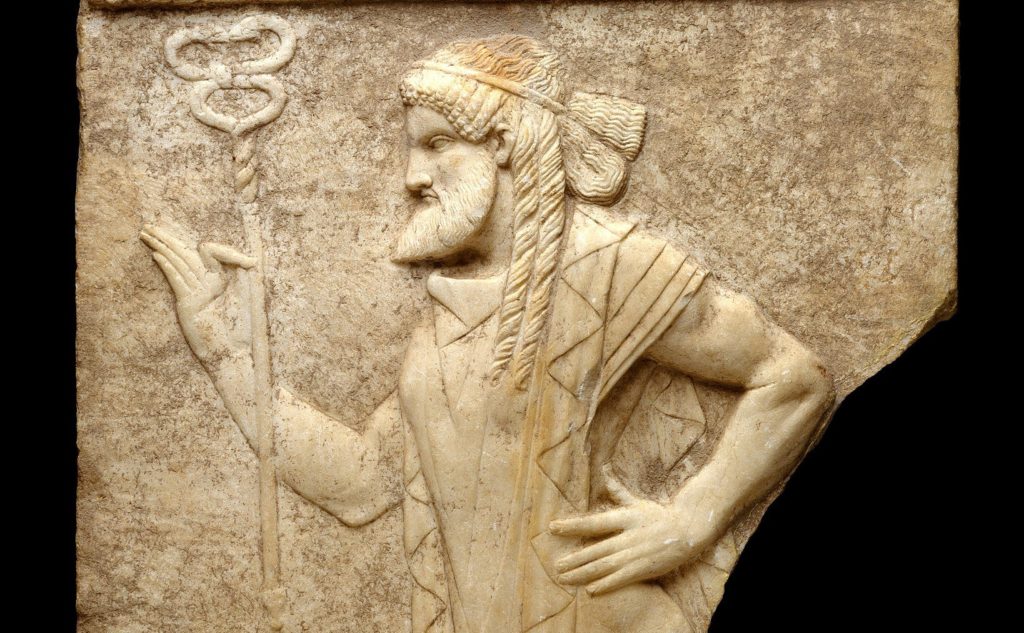
Realms: Travelers, traders, thieves, diplomacy
Family Tree: Son of Zeus; grandson of Atlas
Fun Facts: Traditionally, Hermes invented musical instruments like the lyre and syrinx. His symbols include winged sandals and the caduceus.
As the patron of travelers, Hermes drives shoppers around the mall for free. While driving you around in his golf cart, Hermes notices that you stole your rent money back from Apollo. But he just winks and says nothing — he’s also the god of thieves, so he’s not going to nark on you.
Hermes earned his place in Mount Olympus thanks to his bartering talent. The Olympian created the first lyre and syrinx and convinced Apollo to take them, getting oxen and the gift of prophecy in return, plus a healing staff that could make humans sleep and receive divine messages.
Zeus was so taken by Hermes’ persuasion skills that he made his son a messenger of the gods and equipped him with a new pair of winged sandals. This involved travel and diplomacy, which gave him the realms of merchants, travelers, and diplomats.
READ MORE: Hermes’ Staff: The Caduceus
Athena: Goddess of Wisdom, Courage, Justice, and More
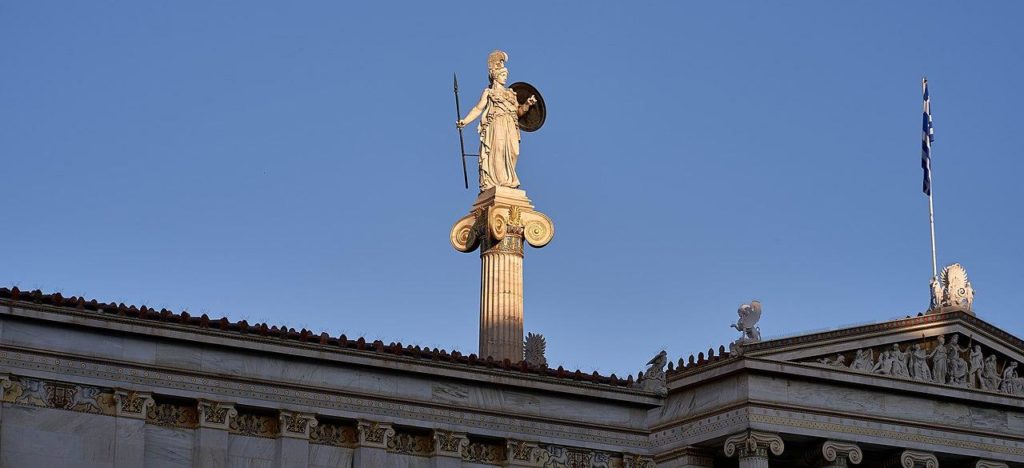
Realms: goddess of wisdom, strategic fighting, inspiration, courage, justice, civilization, mathematics, strength, and skill
Family Tree: She was born from Zeus (and only Zeus — she has no mother)
Fun Fact: Athena is Zeus’ favorite child
Any list of Olympian gods will contain this important Greek goddess. Athena’s realms are legion (as seen above), and nothing about her is ordinary, not even her birth.
According to Greek mythology, Athena was born from Zeus’ forehead after he experienced a bad headache (probably because she emerged fully grown and dressed for battle).
This goddess of wisdom is also a fierce fighter and has no sympathy for those who oppose her. Athena’s favorite punishment is to strike her enemies down with madness.
Known for strategic warfare, she often guides heroes; Athena helped Hercules in his tasks and also assisted Perseus in slaying the monster, Medusa. Her Athena-Assisted Hero Karate Club is the perfect place for anyone to start learning a move or two.
Ares: God of War
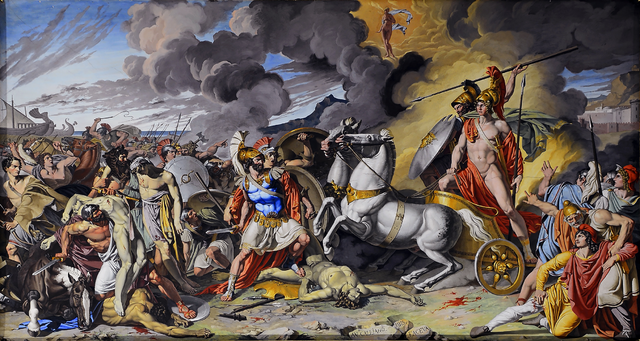
Realms: God of war
Family Tree: Son of Zeus and Hera
Fun Fact: His daughter Hippolyta was queen of the Amazons
You point at a store and Hermes drops you off. There’s a “buy one, get one free” deal on every item inside the weapons shop; you lean more towards pacifism, but that’s a good deal!
There’s no need for introductions with the shopkeeper. You remember Ares’ name from the list of Olympian gods that Hera said were likely to interfere in a marriage. Indeed, this god of war was once banished from Mount Olympus because he had an affair with the married Aphrodite, the goddess of love.
As far as the Greek deity family tree is concerned, Ares isn’t a part of the favorite branch. The Greek pantheon can be brutal but this war god is too aggressive, even for them. And to add to it, his realm isn’t pretty — while his sister, Athena, stood for strategic warfare, Ares, on the other hand, commanded the bloodiest elements of battle and war.
Dionysus: God of Wine
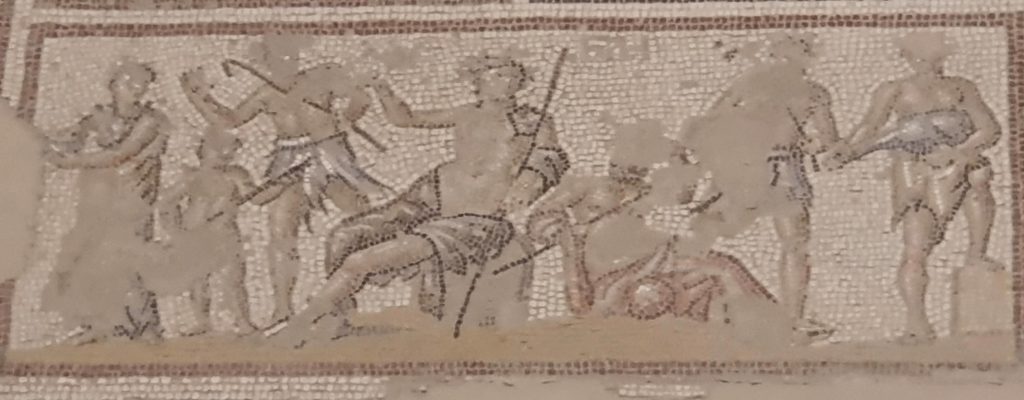
Realms: God of wine, grape farming, wine production, chaos, madness, theater, and spiritual joy
Family Tree: Son of Zeus and Semele
Fun Fact: Hera murdered his mother
Alright, so you have to bring your own cheese — but thanks to the god of wine, you can sip from as many wine amphoras as you like. There are even bunk beds for people who are too drunk to drive back home.
You guessed it, Dionysus is the god of grape farming, winemaking, and wine. When he’s not having a party, this Olympian also nurtures his other realms. Some of them include chaos, ritual madness, religious ecstasy, and theater.
This guy’s birth must be the weirdest in the Olympian gods family tree. Often referred to as the “twice-born” god, he was birthed by both of his parents.
There’s some disagreement about who his mother was, but mostly it’s said that she was a mortal princess called Semele.
Hera killed her after discovering that she was carrying her husband’s child. Zeus removed the fetus — which was the first birth — and then carried his son in his thigh until Dionysus was full-term and ready to be born a second time.
Hestia: Greek Goddess of the Hearth and Home
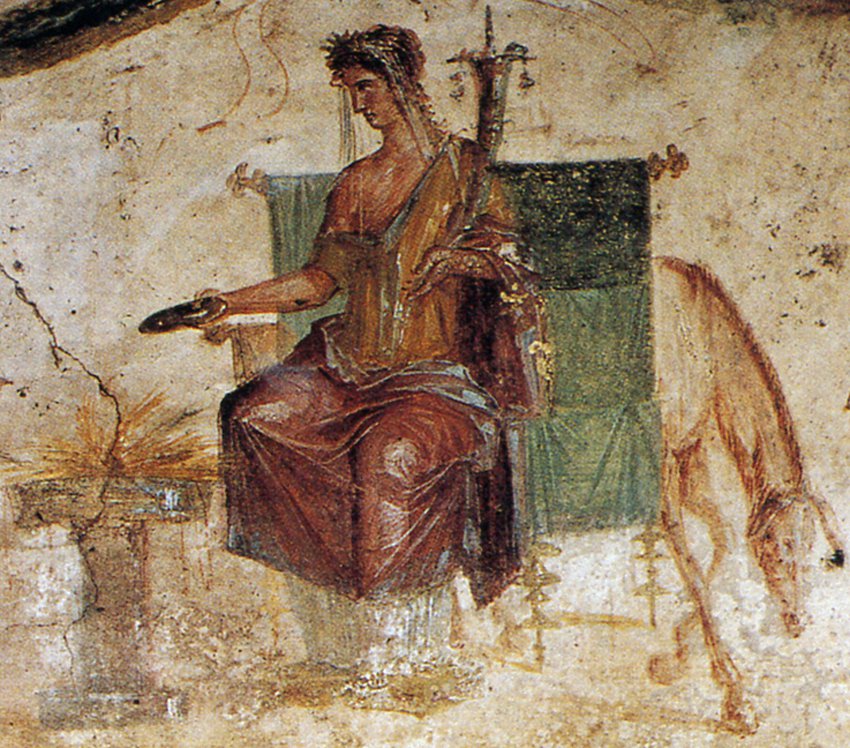
Realm: The hearth, home, domestic life, the family unit
Family Tree: The eldest daughter of Rhea and Cronus; little-big sister to Zeus
Fun Fact: Hestia gave up her Olympian seat to welcome Dionysus
Hestia is likely the kindest of all the gods, known for her warm countenance and generosity. She keeps hearths kindled and is all about family harmony.
Hestia is considered to be a virgin goddess since she swore an oath of chastity to Zeus. This was after Poseidon and Apollo tried to marry her.
Unlike her other relatives, worship of Hestia was both a domestic and civic practice. Public government buildings in cities always had a fire burning in her honor. Because of this, she didn’t have an entire temple erected in her honor.
Hestia was versatile and could be worshipped by anyone, anywhere. She has her own line of matchsticks, but doesn’t visit the mall too often.
“Almost Olympian” Gods
Hades: Greek God of the Underworld
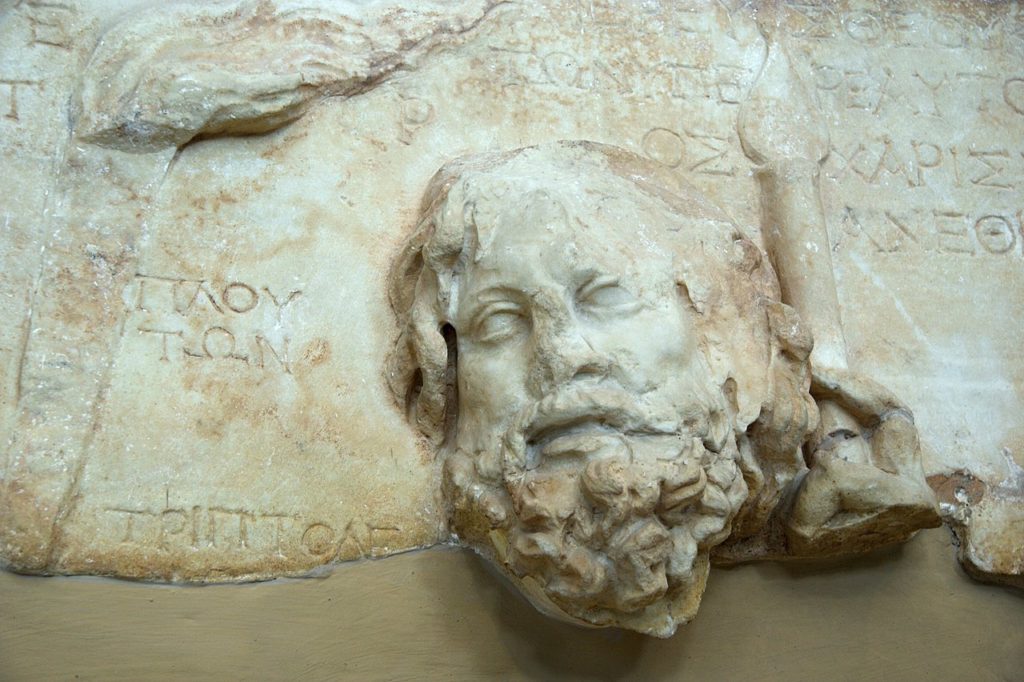
Realms: Ruler of the underworld; god of the dead and wealth
Family Tree: Older brother of Zeus; child of Cronus and Rhea
Fun Fact: Hades helped Zeus to overthrow their father
In Greek mythology, the name Hades also refers to the underworld. Hades-the-god received the hellish kingdom after drawing straws with his brothers and losing. Zeus became the sky god, Poseidon became god of the sea, and Hades was given the land of the dead.
He famously abducted the Greek goddess Persephone, making her his queen, and he was also the god of wealth due to the mineral richness inside the earth. Plus, he commanded the Furies, who tortured dead sinners.
Although closely related to the 12 Olmpian Gods (i.e. the brother of Zeus), and involved in many of their stories, Hades did not live on Mount Olympus and so is not technically considered an Olympian God. But he’s definitely worth mentioning in the same breath.
Other Greek Gods and Goddesses: Children, Grandchildren, and Cousins of the Principle Greek Gods
While the primordial gods, the Titans, and Olympians get their own classification and play the most central role in all of Greek mythology, they are far from the only deities the ancient Greeks worshiped. The many offspring and siblings of these core groups of gods went on to become important foci of worship in their own right.
The existence of these gods show how important they were to the Greek understanding of the world: they had a god for nearly everything. Things can get confusing, but here’s a comprehensive list of some of the most important Greek gods to help you sort things out:
Kratos: God of Strength
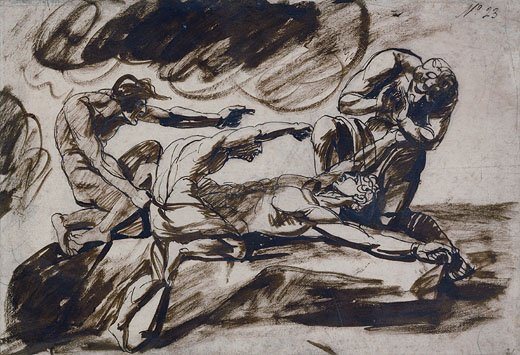
Realms: Strength
Family Tree: Siblings include Nike, Bia, and Zelus
Fun Fact: He appeared in several ancient plays and poems
Kratos takes his job seriously. He’s a close companion of Zeus and likes to carry out the latter’s orders. But he’s not a nice guy. Think more along the lines of a caffeine-deprived guard or henchman.
Several old plays about Greek mythology showed Kratos’ cruel personality. In one of them, Zeus was ticked with Prometheus for stealing fire from the Olympian gods. As punishment, he decided to tie him up somewhere.
The job fell to Kratos and his sister Bia. With the help of a blacksmith, they chained Prometheus to a rock. Kratos enjoyed the task (too much) and made sure that the chains kept his victim in agony.
In some ways, Kratos is the divine personification of the Zeus regime. For that reason, he’s often seen as a law enforcer and not a bully. Hey, take your pick.
Morpheus: God of Dreams and Messages
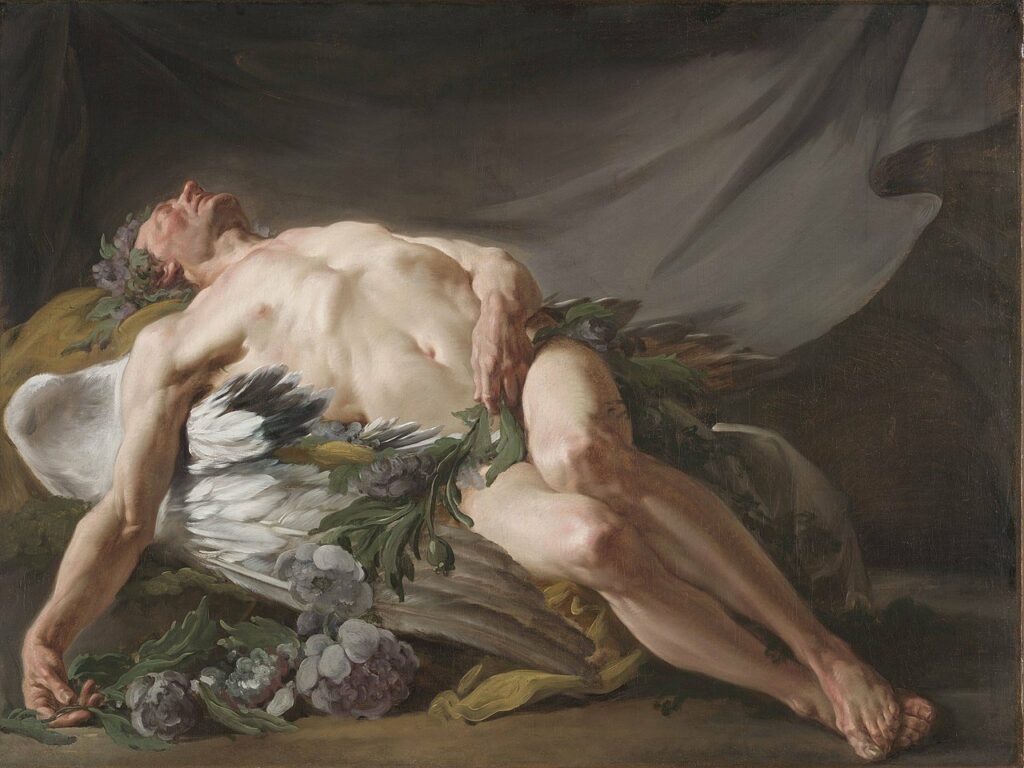
Realms: Dreams, messages
Family Tree: The god of sleep (Hypnos) was his father and the goddess of relaxation (Pasithea) was his mother
Fun Fact: His two brothers also created dreams and, unlike Morpheus, could not control them
Shopping at Olympus Mall can take the stuffing out of anyone. The place is huge and a drain on the feet. It’s also expensive. To treat your fatigue — and fears, after spending your rent money at Apollo’s flea market — pop in at the sleep therapy shop.
This business is run by Morpheus, the god of dreams. At first, it might be hard to spot him because, to mortals, he can appear in any form. To be fair, though, this shop might not soothe you at all.
The god’s main task is to place the gods’ messages in your dreams. Getting a sleep-telegram from Zeus or Kratos probably isn’t the most pleasant. Additionally, if you’re unlucky enough to see the dream god in his true form, say hello to a lot of stress hormones — Morpheus looks like a winged demon.
Charon: The Ferryman to Hades
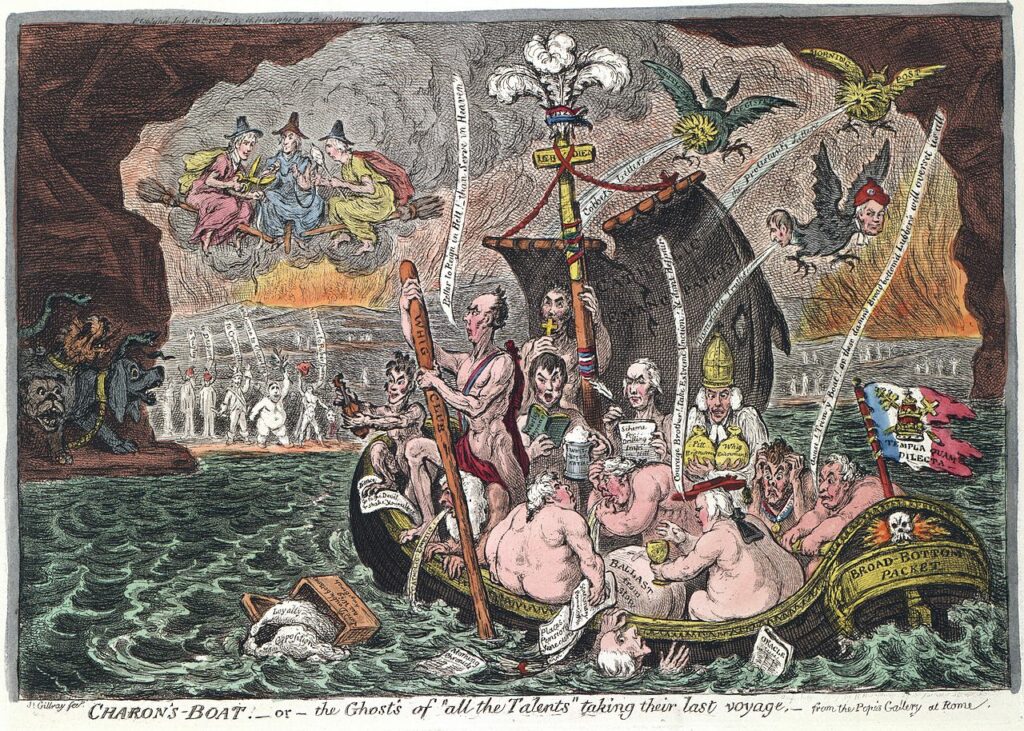
Realms: The river leading to the underworld, Hades
Family Tree: His parents were the primordial gods Nyx and Erebus
Fun Fact: Charon is one of the oldest gods, predating even Zeus
Charon isn’t one of the more well-known Greek deity names. However, his job is nothing to sneeze at. As the ferryman of Hades, he carts freshly-dead souls off to the underworld.
Hermes, the messenger god, drops them off on the bank of the river Acheron but if they can’t pay for passage, Charon dooms them to become ghosts. He even fights the more desperate, penniless ones off with his steering pole. This spawned the ancient rite of placing a coin inside the mouth of the deceased during their funeral.
You decide that you have no business with Charon (yet) and leave him to slowly circle the mall’s moat in search of souls with coins.
Pan: God of Shepherds and Magic
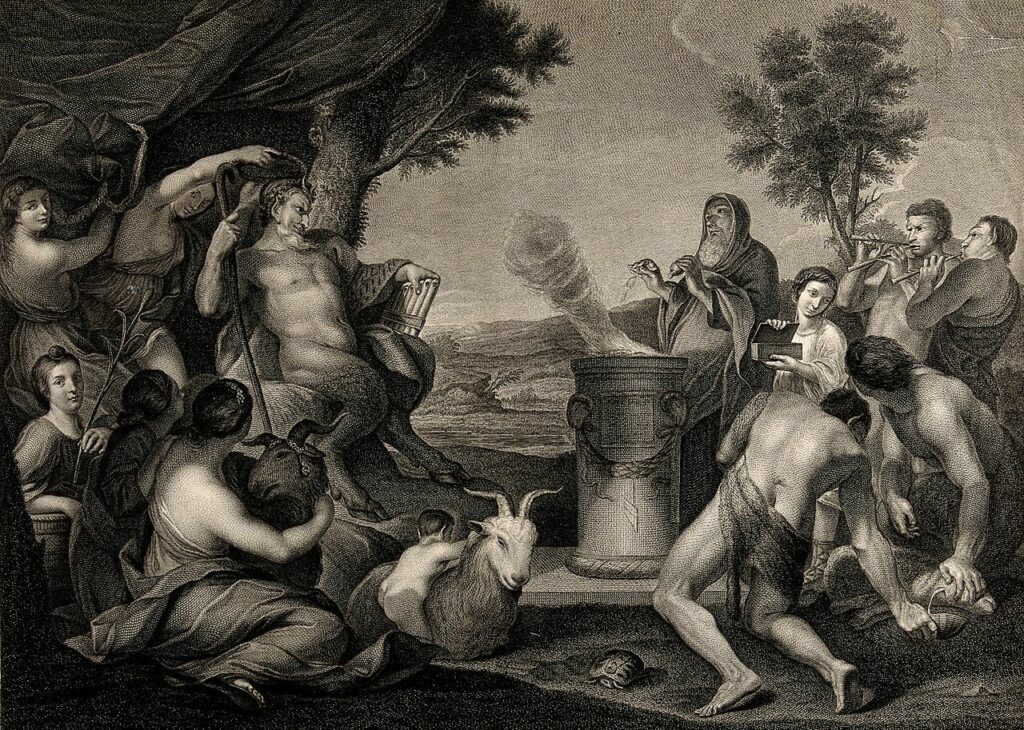
Realms: Shepherds, small game animals, music, and magic
Family Tree: Hermes, the messenger god, could be his father
Fun Fact: Pan has the body of a man but the back legs and horns of a goat
Hermes drives you to the next shop but shakes his head. The businessman you’re about to meet is Pan, who might be his son. Hermes isn’t sure that he’s really the father. Nobody is.
For some reason, Greek mythology just named Hermes as the likeliest candidate. Pan’s mother was a nymph, which could explain Pan’s soft spot for them.
As he delivers you to the Pet and Sacrifice Store, Hermes says he’s not going to hang around and wait for you to come back out because Pan is weird, son or not.
Indeed, besides looking like a half-goat, Pan’s worshippers, mostly shepherds and hunters, sacrificed goats and sheep in caves. The poorer herdsmen sacrificed clay figures (for sale at the shop, along with baby goats to adopt).
He’s also credited with inventing the panpipes — after causing a nymph to die, he turned her into reeds and used the stalks to make the first instrument.
Zephyrus: God of the West Wind
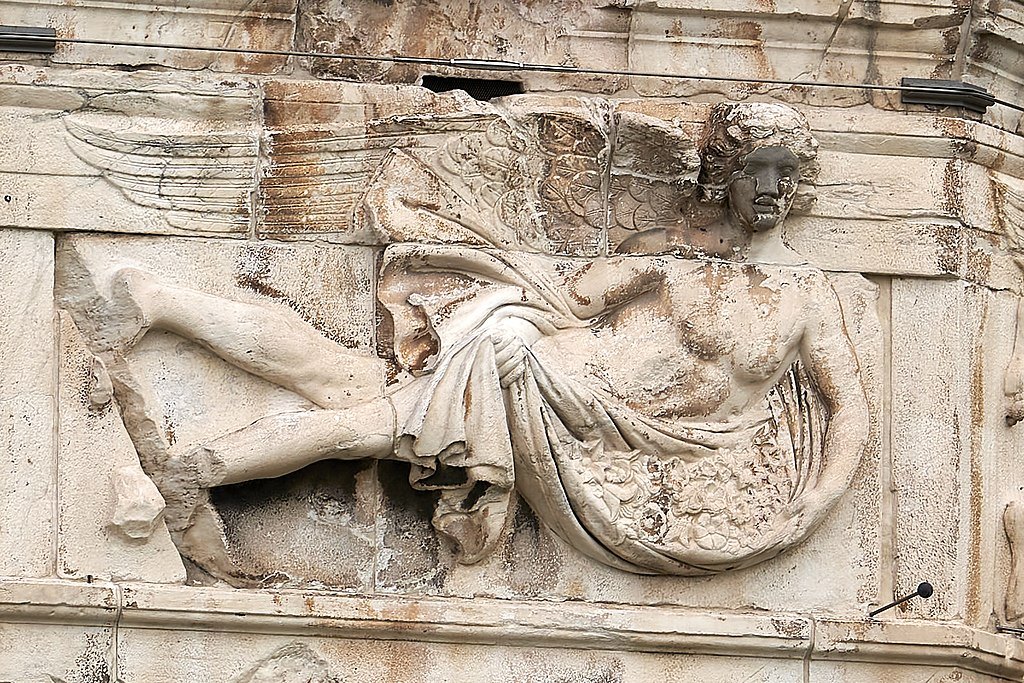
Realms: The west wind, spring, and horses
Family Tree: Married to Chloris; father of Carpus
Fun Fact: Some say that tigers are the children of Zephyrus
You finally find the place where you want to spend your $500 gift voucher. Zephyrus and his family sell air fresheners for vehicles and homes, but you quickly see the problem.
The variety isn’t great and there are no customers; Zephyrus looks surprised to see you. As the god of spring, the west wind, and horses, he can only offer you cards that smell like animal hide, the breeze, and the faint tang of spring.
The Greek goddess, Chloris, is his wife and the goddess of flowers. Their son is the god of fruit. Together, they could’ve added incredible aromas that would’ve made their products more successful, but neither seems to care.
You exchange the gift card for horse smells and leave. You don’t care for Chloris yelling at Zephyrus that the wind god would’ve done better had they opened a fruit and flower market. Being one of the more gentle gods, he just sighs.
Asclepius: God of Medicine
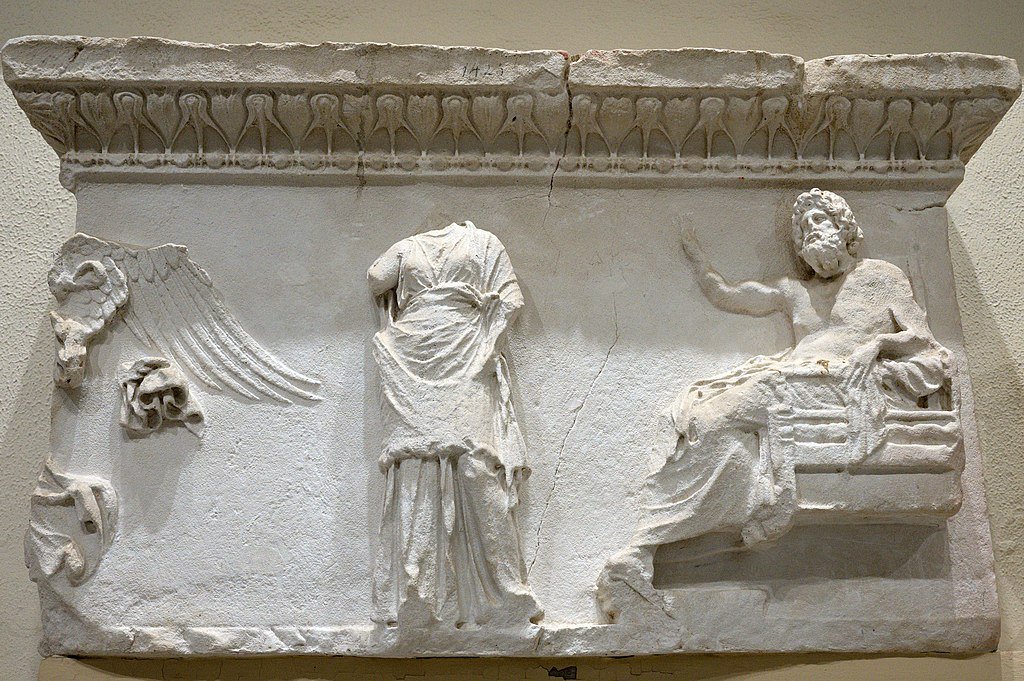
Realms: God of medicine and prophecy
Family Tree: Son of Apollo, a father of Hygeia
Fun Fact: The famous healer, Hippocrates, was supposedly related to this god
Every now and again, Kratos (the security guy) bodyslams a shoplifter. Few get up again. Apollo might be the mall’s doctor but he’s also very busy with his flea market. For emergencies like Kratos-crushed humans, he sends out a paramedic called Asclepius, who is also his son.
Said to have received his medical training from Apollo and the wise centaur Cheiron, Asclepius’ skills were so masterful that Zeus killed him. Yep, pierced him with the old thunderbolt.
You see, Asclepius could cure death, and Zeus feared that this would remove the one thing that made the Greek pantheon actual gods and kept the humans mortal — the fact that people die and the gods can survive death.
Indeed, Asclepius did come back as a fully-fledged god, as, prior to his death, he was a half-god because his mother was mortal.
READ MORE: 10 gods of death and the underworld
Deimos: God of Dread and Terror
God Name: Deimos
Realms: The god of dread and terror
Family Tree: Son of Ares and Aphrodite
Fun Fact: His name terrified ancient soldiers as this god brought defeat on the battlefield
Aphrodite might be his mother, but Deimos inherited nothing from the Greek goddess of love. Instead, he often joins his father Ares, the god of war, in battle.
But while his dad represents the physical horrors of war, Deimos takes things a terrifying step further — he messes with people’s minds. This god spreads panic, terror, and dread amongst those caught in the conflict of war.
Since this is bad for business, Zeus told Deimos he can still freak people out, but they have to buy a ticket to his horror-only movie theater inside the mall.
Helios: God of the Sun

Realms: God of the Sun
Family Tree: Son of Hyperion and Theia
Fun Fact: A massive statue of Helios was among the seven wonders of the ancient world
The show floor inside the mall is supposed to hold the best vehicle models, but all you see are gigantic golden bowls. The god of the sun sidles up to you, salesman-style.
Helios explains that the golden bowls are the transport choice of gods and heroes, so why not you too?
He creates Day by riding his fiery chariot across the sky, but by Night he rests during the return journey inside one of these precious vessels. It’s like a self-driving car, just with more bling — he even gave Hercules a bowl during one of his twelve missions.
The hero sailed the ocean in his vessel to steal a bunch of sacred cows; there’s plenty of trunk space, too, because Hercules loaded the entire herd onto the bowl. The thing flies, floats, and packs a load. Not bad.
Alastor: God of Retribution and Justice
Realms: Retribution, justice, and blood feuds
Family Tree: Grandson of Poseidon
Fun Fact: Some experts claim that Zeus used this name for his avenger persona
Poseidon, who runs the black market, refers you to his grandson. If you want to purchase revenge, justice, or a blood feud, you should head over to Alastor’s restaurant.
Alastor’s bitterness makes him a dedicated god of retribution. Greek mythology names Neleus as his father. Born to a mortal mother and Poseidon, Neleus had several sons — including Alastor.
One day, Hercules ambled along and murdered Neleus and most of his boys over a grudge. Alastor was among the murder victims. In death, he became the god of vengeance and still stirs blood feuds so that his death will not be forgotten.
Proteus: God of Prophecies
Realms: Prophesy, shepherd of sea animals
Fun Fact: Symbolized the matter used to create the world
You politely decline to meet what sounds like Poseidon’s worst grandkid. Instead, an elderly gentleman standing next to the sea god catches your eye. He’s wearing a nametag that says “Proteus” and that rings a bell.
You’ve heard other shoppers mention him with annoyance. Apparently, he’s a god that serves Poseidon and he’s also a prophet who lives in the sea.
He can answer any question — but you have to get a good grip on him first. And that’s almost impossible, since Proteus can shapeshift into anything.
However, wrestling this god to the floor is worth the effort. Proteus knows everything about the future, the present, and the past.
Castor and Pollux: Twin Gods of Sport, Hospitality, and More
Realms: Horses, sport, hospitality, the home, friendship, oaths, sailors, and warriors
Family Tree: Twin sons of Leda; brothers of Helen of Sparta
Fun Fact: Castor and Pollux had different fathers
The Olympian gods’ family tree doesn’t get any weirder than this.
It’s possible that the most famous twins in Greek mythology, Castor and Pollux, were half-brothers. Their mother was Leda, and Zeus was the father of Pollux. Since Tyndareus — the king of Sparta — was Castor’s dad, this made him mortal.
However, there are several different myths that explain how the twins switched places every day to share the immortality that Pollux was born with.
Strongly linked with the war-loving Sparta, the brothers got into all sorts of mischief. If that’s your flavor, join their extreme adventure club.
But don’t worry about the dangers — the twins are the dedicated protectors of warriors and sailors, so choose only the extreme water and close-contact sports packages. If you want to climb a mountain you’re on your own.
Pallas: God of Warcraft
Realms: God of warcraft
Family Tree: Father of Kratos and Nike
Fun Fact: He was another ancient god that existed before the Olympians
You pass by the jail called Tartarus again. This time, standing among all the teenagers, you notice a goat. But it’s not actually an animal — it’s the god Pallas.
His generation, the Titans that existed before most of the other gods, all received critter bodies. The goat-look was given to him.
Zeus threw him into Tartarus, because — of all Olympian gods — Pallas had chosen Athena to pick on. In Greek mythology, the god of warcraft felt a little lusty and attacked her. So she skinned him and turned his hide into a battle shield.
The bad attitude of Pallas is hardly surprising when you look at this Greek god’s family tree. He’s the father of Kratos, the crazy mall guard.
Aeolus: God of Winds
Realms: Minor god of winds
Fun Fact: The winds he controlled were horse-shaped
There’s a celebrity A-list of Olympian gods and Aeolus is at the top. You can barely see the guy so many people are clamoring around him for his signature. Indeed, it’s not every day that you meet the star in Homer’s Odyssey.
In this myth, Aeolus provided sanctuary for the lost Odysseus and his ship’s crew. Thanks to Homer, Aeolus was among the most famous of Greek diety names in ancient times.
But these days, when Aeolus isn’t soaking up mortal admiration, he controls the world’s winds. He keeps them inside caves on the island of Aeolia and releases a breeze or a storm every so often.
Geras: God of Old Age
Realms: God of old age
Family Tree: Son of Nyx and Erebus
Fun Fact: His name inspired the word “geriatric,” which describes the elderly
Geras isn’t among the more familiar Greek mythology names. He even looks different — most of the Greek pantheon resembles gym-loving models but he’s a wrinkly old man. Hardly surprising, since he is the god of old age.
He’s also seen as the opposite of the Greek goddess of youth, Hebe, the daughter of Zeus and Hera and the goddess of youth or the prime of life. There isn’t a lot of information about this unusual god but nobody at his bingo hall cares. Geras provides free deli muffins and tea for each card he sells. The first person to yell “Bingo!” also gets a lifetime supply of tiny marzipan gods.
Nike: God of Strength and Victory
Realms: Strength, speed, and victory
Family Tree: Sister of Kratos; daughter of Pallas and Styx
Fun Fact: Her name was chosen by the Nike sports company because they were a fan of her realms
This Greek goddess is an important figure in the Zeus-Network. Her business is located in the premium part of the mall right next to his office, and this reflects an old relationship between them.
Nike acted as charioteer for the Olympian king during his greatest battle with the titans. As a reward, Zeus placed her on a seat next to him and promised to protect her forever.
He also made her the goddess of victory and speed for all eternity. As such, Nike often holds a winner’s wreath or a cup to toast success.
Inside her shoe store, Nike claims that her worshippers live forever. But the ancient Greeks also venerated the goddess to reach immortality, and clearly none of them are around anymore. Take that promise with a pinch of salt.
Nemesis: Goddess of Divine Retribution
God Name: Nemesis
Realms: Divine retribution
Family Tree: Daughter of Nyx
Fun Fact: There are claims that she’s Helen of Troy’s mother
Nemesis is the Greek goddess of retribution. When she spots an evil-doer or a fortune unfairly gained, she’ll swoop in and punish the guilty. In Greek mythology, Nemesis mostly deals with matters of the heart. This gave her the idea to open a hypnotherapy office at the mall.
But you might want to think twice before spilling your secrets to this goddess — especially when there’s pride involved.
Most people know the story of Narcissus; he was a man of exceptional beauty, and, after seeing himself in a pool of water, he fell in love with his reflection. Narcissus refused to leave the image and died of starvation.
Nemesis was the one who tired of his pride (as he treated his admirers badly) and led him to the pool and his death.
Iris: Goddess of Rainbows
God Name: Iris
Realms: Rainbows
Family Tree: She might be the daughter of Electra
Fun Fact: Ancient art often showed Iris with wings
Iris has a fun realm — she gets to play with rainbows. In Greek mythology, she’s not described in detail as much as the rest of the Greek pantheon on Mount Olympus, but ancient poets did leave us a few clues.
Homer described her as a messenger of the Olympian gods, which could be why some artists gave her wings. Another Greek poet, Hesiod, described a role the rainbow goddess played in promises.
Whenever the Olympian gods made a solemn oath, she scooped water from the River Styx and carried it to them. They drank the water, knowing it would knock them unconscious for a year should they break their oath.
At the mall, Iris gives paper cups filled with water to thirsty shoppers on the go. But be warned, she scoops the liquid from the River Styx. If you’re parched, take a gulp — just don’t think about any promises while doing so.
Hecate: God of Magic, Witchcraft, and Supernatural Creatures
God Name: Hecate
Realms: Magic, witchcraft, doorways, the Moon, supernatural creatures of the night
Family Tree: She might be a daughter of Zeus
Fun Fact: According to the Greek poet Hesiod, Zeus valued Hecate above all the other Olympian gods
If you hate rainbows because they’re “too happy” and prefer the dark side of things, then Hecate’s your lass. This goddess holds the most magical realms of all Olympian gods.
Besides ruling over all things witchy, Hecate also guards doors — even the entrance to Hades. At her Hex & Herb shop, she offers big discounts for those under her protection. They include fishermen, children, shepherds, warriors, hunters, and athletes.
Ancient sorceresses also sought out this Greek goddess to strengthen their spells. But it doesn’t matter if you’re a good witch or a bad one — Hecate embraces both her own good and evil sides.
Hecate had a special connection with the Empusa, shapeshifting monsters of Greek Mythology. In some accounts, the empusai (plural of empusa) are said to be the daughters of Hecate.
Tyche: Goddess of Chance and Risk
Realms: Chance and risk
Family Tree: The possible daughter of Zeus, or Oceanus and his consort — Tethys
Fun Fact: According to legend, Palamedes invented the first pair of dice and dedicated them to Tyche
Tyche is one busy Greek goddess. She’s got the curious position of dispensing fortune in an unpredictable manner while also toning down the wrath of the Greek pantheon. In particular, Tyche was said to calm Nemesis when the latter wanted to punish someone.
For this reason, this goddess is the perfect deity to run the mall’s casino, where she bestows luck and loss at her whim. While influencing the one-armed bandits, Tyche remains vigilant of any angry-looking Olympian gods about to violate someone’s rights.
Mania: God of the Mentally Ill
Realms: The mentally ill, the dead
Family Tree: Daughter of Erebus and Nyx
Fun Fact: Today, her name is used to describe insanity or excessive excitement
This Greek goddess refused to open a shop. The idea makes her angry, so she just stalks the place, glaring at customers through her goth eyeliner, wearing black and hating her parents.
Who can blame her for being mad at life? Maybe she wanted to become a positive, happy career person. Like Iris and her rainbows.
Instead, Mania was raised by a family who only expressed themselves with negative emotions, and she was given the job of making the ancient Greeks insane and sharing the duties of ruling the dead in the underworld.
Persephone: Goddess of Spring and Nature
God Name: Persephone
Realms: Spring, nature, vegetation, queen of the underworld
Family Tree: Daughter of Demeter and Zeus
Fun Fact: Persephone had many important cults in the ancient world
Persephone is mostly known in Greek mythology for her abduction by Hades — and her mother’s persistence in rescuing her. However, this Greek goddess has her own realms apart from being the queen of the underworld.
She remains tied to Hades since he tricked her into eating pomegranate seeds, which ensured that she must return to him a few months out of every year.
This is why Persephone is also the goddess of spring — when she slinks to the underworld, her mother mourns and winter follows. But when she returns, spring returns with her.
Fittingly, she’s also the goddess of fertility, vegetation, and nature. The ancient Greeks saw her as the all-pervasive rejuvenating force. A handy attribute when your beauty shop peels anti-wrinkle masks from the faces of mortals to renew their look.
Thank You for Shopping at the Mount Olympus Mall!
What a weird shopping experience — but at least you had the opportunity to meet some of the most important deities in the Greek pantheon.
You learned all about the Greek god’s family tree and how they control everything on Earth; from the seasons to everyday skills. You also discovered their very human flaws — these sacred beings can get vain, jealous, power-hungry, and downright cruel sometimes (a lot of the time).
But at the end of the day, the mall provided a mere taste of the exquisite essence of Greek mythology. Hopefully, this inspires you to learn more about your favorite Olympian gods and goddesses!
I didn’t realize there were so many gods…
right!?!
There awareness of the Unknown God is the final real God…Paul explains this God to the Greeks….The Way The Truth and the Light…check out Paul’s visit to Athens.